#and the means by which people articulate the same value is DIFFERENT
Note
only tangentially related but sometimes I wonder if survivorship bias makes us view modern art as less than older art, that time and cultural memory acts as a natural bullshit filter, that actually people were just as vapid and pretentious back then, but none of the vapid and pretentious work had enough cultural value stick around to be examined now
I think it's partly this, but it's partly something else.
This is probably gonna piss a lot of people off, but I think in a particular sense, contemporary art is just... straightforwardly more advanced than older art. I know, I know, but hear me out: I don't mean that as a value judgement. What I mean is like...
Ok, take math as an example. Math started out talking about things that everybody's heard of: triangles, circles, whole numbers. But as those concepts were better understood, they got abstracted more and more. Symmetries of shapes where abstracted to symmetry groups, numbers abstracted to rings and fields, eventually it was all abstracted to category theory, and so on. And now if you look at major research topics in modern math, things like e.g. the Langlands program, as a non-expert, it often looks like a bunch of fucking nonsense about bullshit objects that don't have anything to do with the real world! But even though I don't understand the Langlands program itself, I know enough math to understand why all the levels of abstraction that I have understood are meaningful and valuable, and I can see why going even further would be too. And math is useful enough that the results often speak for themselves.
So I think contemporary art is much like this. If you read contemporary art theory, you will immediately see that it is all very meta. Art used to be made about very concrete things—people and nice looking vistas and so on—that anyone could understand. And then theorists came along and built up frameworks for thinking about art, because they wanted to understand why that art worked, why it was powerful and emotive. And then new, avant-garde artist came along and made art about the frameworks, pushing at their edge-cases or exploring their unintuitive implications. And then new frameworks were built up to understand that art, rinse and repeat. This account is, as I understand it, a little bit ahistorical—the building and the pushing of frameworks was often simultaneous and often not clearly articulated. Although, frankly, the same could be said for the history of math. But in retrospect I think a pretty undeniable picture emerges.
So, to put it bluntly, I think one of the reasons so much contemporary art looks vapid is that it isn't for you. It's about things you've never heard of, in the same way that category theory is about spaces and morphisms, and explaining that to someone who's never heard of groups or topological spaces is basically impossible. And I think there are some differences—art is obviously, you know, totally vibes based in a way that math isn't. If a big wire sculpture with styrofoam cups on it or whatever doesn't speak to you then it doesn't speak to you, no one can defend it on "objective" grounds. And art isn't useful in the way that math is, so it doesn't demonstrate its validity to people who don't get it in any way. But what I wish people understood is that there are people, who know a bunch of art theory and art history, who that wire sculpture with styrofoam cups on it does speak to. It makes them go "oh, I love how it plays off of X and contrasts with Y" etc. etc. And that isn't going to happen for you because, like, you don't know what X or Y even are! But that doesn't make it valueless, it just makes it insular. Which, you know, contemporary art really is! I think there are a lot of contemporary artists who claim to not be doing what I just described, who claim to be making art "for everybody", but I think if you read their artist statements and stuff it often becomes pretty clear that this is not the case. And this is a valid criticism of contemporary art! But "vapid" is mostly not.
Pretentious, definitely. It's pretentious as fuck.
1K notes
·
View notes
Text
What Does the Lion Turtle Chant Mean?
A podcast episode about the spirituality of Avatar: The Last Airbender.
Transcript Preview:
Many people have told me they struggle to take Sozin’s Comet seriously because they would have killed the Fire Lord without hesitation. And, look, as far as I’m concerned — if you’re willing to kill a genocidal colonizer, good for you! Many blessings upon your journey! And the show isn’t trying to dissuade you.
Aang is not the only voice of wisdom in Avatar. He’s not a puppet through which the text articulates its meaning. Avatar is about cultural exchange. When one character says what they think is true, that isn’t necessarily the moral of a story. That’s one voice, and the story is a conversation. So, I don’t think that Sozin’s Comet is using Aang to say “Hey, you, you, looking at the TV, you personally should never support violent revolution!” Water Tribe culture doesn’t seem to have any problem with killing on the battlefield.
When Sokka lops off the Melon Lord’s head, there’s some very clear indications that we’re supposed to be troubled. The musical cue, Momo eating the melon, he lingering focus on Aang’s reaction … But I don’t think this scene is meant to communicate that Sokka is a bad guy. Or that soldiers are inherently bad people. I assume that Hakoda, Bato, and Tyro killed people. These figures are portrayed as admirable, and even as mentors.
The scene in which Sokka kills the Melon Lord is there to illustrate the difference between Southern Water Tribe culture and Air Nomad culture. Sokka’s journey is about embracing and reclaiming all the parts of his culture that the Fire Nation tried to destroy. He wasn’t able to go ice dodging or to train as a wolf warrior, but he has found a way to become a strong, protective man anyways. And that does mean that he’s willing to kill or die for a cause he believes in. This scene doesn’t communicate that Sokka is a bad person. It communicates that Sokka is walking his own path, and that Aang is walking a different path. But the show doesn’t try to tell you one of them is wrong and the other is right.
At the same time, I think we need to remember that Aang is saying something he believes. It’s not just an emotional problem for him.
Aang gives multiple related, but different reasons not to kill the Fire Lord.
“I didn’t feel like myself.”
The Fire Lord “is still a human being.”
Killing goes against “everything the monks taught me.”
“All life is sacred.”
In Southern Raiders, he also makes a more general claim that “violence is never the answer,” but I think that the writers had to use the word “violence” as a euphemism. In our normal usage of the word, punching somebody would be a “violent” act. Aang clearly has no problem whacking people over the head or shooting wind at them. I think this is a way of making the show more kid friendly, and that what Aang actually means is
“[Killing] is never the answer.”
Some of these claims are about Aang as an individual. He’s saying he doesn’t feel like he, specifically, can kill someone. That it goes against the values of his culture. And some of these are universal claims. He’s saying no one should kill, not ever.
But he also believes in a separate ethical mandate. As the Avatar, he has to protect the world. In this lifetime, that means preventing the Fire Lord from burning the Earth Kingdom.
This is a story about moral standards, and they seem impossible to live up to. There’s no easy answer. If you believe that murder is wrong, and you believe in the duties of the Avatar, then you have a conflict of values, not just emotions. In order to understand the Buddhist themes of Sozin’s Comet, we have to understand Buddhist ideas of morality.
This podcast episode
Bluesky
Substack
Twitter
Patreon
Nate's short story about Buddhism
Transcript with Citations
143 notes
·
View notes
Note
Hey this is only tangential to the AI art thing, but I'm curious how you feel about the distinction between plagiarism and information property infringement?
I take issue with plagiarism (which isn't what AI art is doing anyway) but I don't think copyright law is the place to solve it. IP as a concept and copyright as a practice I feel only have meaning within the bounds of capitalism and are mostly vehicles for capitalists to extract more value from creative labor, but I still think plagiarism would be wrong even if there was no publication-as-means-to-survival element.
Like, passing off someone else's work as your own at the very least feels different from owning the right to profit from that work. But simultaneously it does seem like even that is veering toward an 'economics of clout' if that makes any sense. Like, I would still be upset (albeit, much less so than if I relied on that work to eat) if I made something cool and someone else got the credit, but I think I lack the vocab to articulate why or whether a meaningful difference actually exists.
For clarity, my background is in research rather than art so maybe that affects my thinking?
If you don't feel like writing a full response, name-dropping a book or an article for me to get started would be greatly appreciated too.
yeah i mean i think the thing about plagiarism that differentiates it from copyright infringement is that imo the crucial part of plagiarism is taking the name off the thing. like, plagiarism fundamentally is not a crime of taking or distributing something, it's about refusing to name the author, about purposefully lying about the origins of a piece. & i think it is bad while copyright infringement is not because it inherently muddies the water of truth -- like, to take the recent high-profile somerton case, i think one of the really bad things about his plagiarism was that he was mixing plagiarised research and journalism with ad-libbed nonsense like "the SS was teeming with homosexuals", and without attribution people were led to assume that the well-researched accounts of queer history were from the same source as the insane claims, which lent somerton's editorializing totally uneared credibility.
but yknow i think that in many cases copyright law legalizes plagiarism. like the only difference between ghostwriting and plagiarism is that one is legal -- i often think about how atari didn't credit game developers on their early games, or how game studios still find bullshit reasons to not credit workers now. hell, i screenshot someone in the notes of an AI art discourse post sayting shrek was "the hard work of Dreamworks Studios", which to me is just as much of a misattribution of credit as saying james somerton wrote his videos.
185 notes
·
View notes
Note
a few weeks ago i saw a video on twitter thats of some guy talking about how amazing it is that all these people make a pencil and then you can buy it etc. is this the type of stuff you/cordelia mean when youre talking about how some people actually take domination to be a great thing (not only consciously but as an actual articulated value, i mean)
i assume the video was friedman's "i, pencil" riff, which does get at some of those points (and which other socialists have responded to on similar terrain, doing the thing i talk about of merely describing the same processes but with different moralizations), but also at a more general level in the sense that the impersonal mechanisms of capitalism are seen as nondiscriminatory, which for liberal theorists is a major advance over the more direct forms of coercion found in pre-capitalist societies. the benefit here is that markets don't really care about your background, your money is as good as anyone else's, and there's a certain universalizing tendency which comes out of the formal equality which is baked into this logic.
this is echoed in the writings of plenty of classical liberal thinkers like walter e williams that argued segregation would've dissolved on its own if free market forces had been left to run their course, unhindered by racist laws upholding the forced separation of people. eventually, certain business owners would've put their profits before their potential racism, and other firms would've been forced to similarly accommodate in order to stay competitive. williams (who was black) actually criticized some of his friends at the time for spending their money in white businesses that they'd been previously barred from, because in their attempt to stick it to the shop owners that the day before had refused to service them, they were unintentionally enriching racists instead of giving their business to firms that would've taken their money all along, had it been legal and easy to do so. this particular problem (and its market solution) are sometimes dealt with in the context of things like the sears catalog during the jim crow era, which was a big talking point a few years ago as an instance of this market anonymity/impersonality delivering a certain form of economic fairness.
for a lot of marxists, this nondiscriminatory element isn't acknowledged for the merits of not caring about your background, but in some sense for not caring about you at all. everything is reduced to the merely economic. marx pretty famously says as much in the manifesto when he writes:
"The bourgeoisie, wherever it has got the upper hand, has put an end to all feudal, patriarchal, idyllic relations. It has pitilessly torn asunder the motley feudal ties that bound man to his “natural superiors”, and has left remaining no other nexus between man and man than naked self-interest, than callous “cash payment”. It has drowned the most heavenly ecstasies of religious fervour, of chivalrous enthusiasm, of philistine sentimentalism, in the icy water of egotistical calculation. It has resolved personal worth into exchange value, and in place of the numberless indefeasible chartered freedoms, has set up that single, unconscionable freedom — Free Trade. In one word, for exploitation, veiled by religious and political illusions, it has substituted naked, shameless, direct, brutal exploitation."
this is also what's at stake in the formal equality of the worker in marx's capital, who, as a newly emerged legal subject with all the rights that entails, discovers their double freedom -- free to work or free to starve. and as he says there in v1, "between equal rights force decides".
what i think is significant here is that these aren't really two different accounts of how the system works. for people like smith and hayek, this impersonal mechanism (the invisible hand, etc) is understood as a kind of coercive force which pushes firms toward particular ends which are independent of the wills of any singular capitalist (and in fact express the whole of human economic activity in the aggregate) and which result in the universal generalization of particular principles throughout society, increasingly undermining lingering prejudices (eg smiths capitalist arguments against slavery). marx's analysis is pretty much identical (and this is the point), except in its normative angling. the totalizing character of capitalist production which recreates the world in its own bourgeois image and strives to constantly overcome its own self-imposed limits is similarly impersonal and indiscriminate, but this is presented as a problem to be overcome. hayek, even moreso than smith, recognizes this aspect of the price system which gets at the exact issue which marx is trying to highlight with his analysis of value.
both are aware of the historical uniqueness of the social formation and have no illusions about it via cliche appeals to "human nature" etc, and as i've mentioned above, its not really a difference in analysis, or even really in results (as cordelia has said, the strong form of the marxian complaint isn't that capitalism is doing something poorly, but that these are the effects when it is working well/asserting itself fully). so the point im making and have made repeatedly is that what's at stake here is a set of underlying normative commitments which marx and marxists have basically left unjustified. the usual claim is that marx was too scientific for that sort of thing, but i don't think that's really a possible reading (and if it is, it's not a good/internally defensible one).
if anything, the immanence of his analysis to the liberal theory which constitutes his object sets the limit on his ability to express himself fully, but it also provides the only adequate place to ground his normative account. his notion of contradiction is supposed to do a lot of the heavy lifting here, but to the extent that these contradictions are located in liberal theory itself, they *necessarily* don't go unaccounted for by liberals. he's not saying or demonstrating anything which hasn't also been posed as a liberal political problem. if you don't like crises, then very well, you can be a keynesian (maybe even a radical one). you don't think that works? well, your argument probably sounds a lot like hayek's. what is marx able to contribute here that isn't already understood as a careful balancing act -- if not a definite limit -- in liberal theory? the potential salvation of communism, which is supposed to overcome the problems (whatever they are taken to be) of capitalism, necessarily stems from some set of normative commitments that can't be written off. if his critique is tightly immanent, as it arguably was, then what marxists need to justify isn't really the account of the system (you don't even have to be a marxist for that!) but the case for its abolition.
if your problem with it is "domination", you need to be able to demonstrate what's wrong with the mechanisms that word is intended to describe, and it can't just be that they're impersonal or coercive. liberals feel the same way about these things and all of us experience gravity that way. you have to be able to say something more than that, but contemporary marxist accounts tend to only go as far as calling it "domination" and getting away with it because the marxists nod along, knowing that domination is naughty, otherwise why would we call it domination?
so, although cordelia can surely speak for herself, this is part of the project that i think she and i have sorta been picking away at in different ways for a while, with me catching on a bit later (maybe too late tbh). when i expressed my frustrations on this point, directed at chambers, i was in some sense admitting that she'd won me over on this style (if not the specific line) of questioning.
all of this aside, this is of course not a defense of liberalism in the liberal sense, but it is a kind of "defense" of liberalism as a project which has to be taken seriously and can't be written off or dreamed away. in this sense, i am merely following in marx's footsteps, who i think felt very strongly about the need to grapple with liberalism on exactly this kind of terrain, but i am turning the ruthless criticism on the ruthless critic, because i don't think he or his contemporary disciples in the value-as-domination literature have done a good job of navigating this problem. probably though, like nearly everyone else, i'm simply left waiting for cordelia's book.
66 notes
·
View notes
Text
PROOF THAT SHINRAN IS ONE OF THE MOST BRILLIANTLY WRITTEN ROMANCES OF ALL TIME - PART 3
if you haven't already read the posts i've linked down below, please make sure to do so before you proceed, cause they're important for context. thank you so much in advance!
CLICK HERE FOR PART 1
CLICK HERE FOR PART 2
IMPORTANT DISCLAIMER
as i've already explained in my disclaimer, my ultimate goal with this masterlist is to prove how well written shinran is - it's to demonstrate that they're unquestionably each other's half and the heart of the dcmk universe.
people often minimize the importance that shinichi and ran have in each other's lives by labeling them as boring, predictable "childhood sweethearts" which couldn't be further from the truth.
so far we've established that
1) shinichi doesn't fall for ran gradually, which is what usually happens with dcmk childhood friends, he knows right away that ran's something special.
2) even though they share the same core values, their personalities are very different, which has a positive effect on them individually: ran gets shinichi to come out of his shell and contributes to his emotional growth, while shinichi grounds ran and helps her articulate her feelings.
now it's time to analyze the part i teased in part two already:
they share a soul
god, where do i even begin? this post is probably going to be ridiculously long but it's by far the most crucial part of my analysis, so please bear with me. cause as far as i'm concerned? this is the main reason why shinichi and ran belong together.
don't get me wrong, love at first sight is a beautiful concept and i deeply appreciate the fact that shinichi and ran complement each other, however, they aren't the only dcmk duo that brings out the best in each other.
what sets them apart from other dcmk dynamics in the most meaningful way is the undeniable fact that their hearts are one and the same. but what is that even supposed to mean? let's break it down, shall we?
their intuition
this segment of the break-down deserves its own post, because there are countless instances of shinichi and ran showcasing incredible instincts, but i'll try to keep it concise for now. both shin and ran arguably have a sixth sense. that's already fascinating on its own, but what i'm really trying to home in on is that their intuition offers them great insight into other people's souls. sometimes i get the impression they carry a compass that points at people and tells them who's trustworthy and who's not.
chapter 22
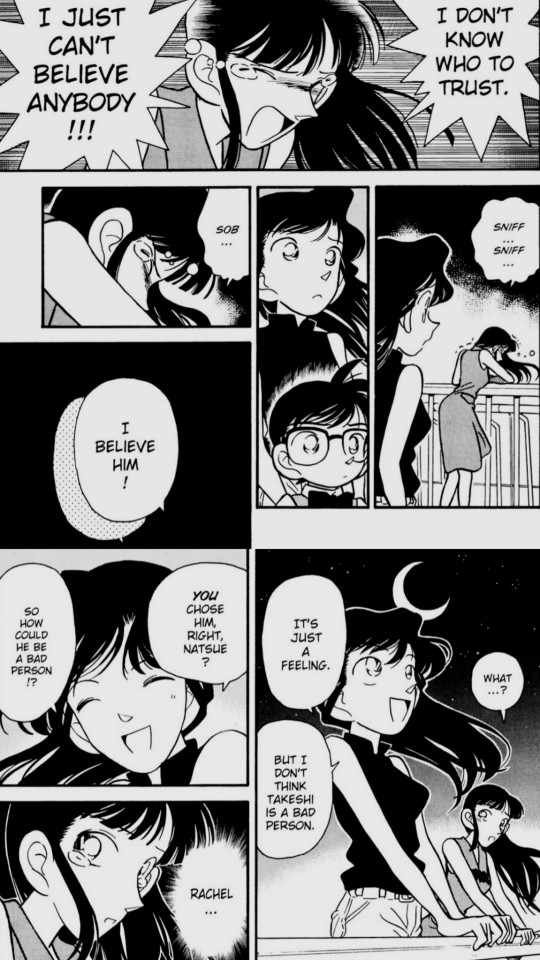
chapter 892
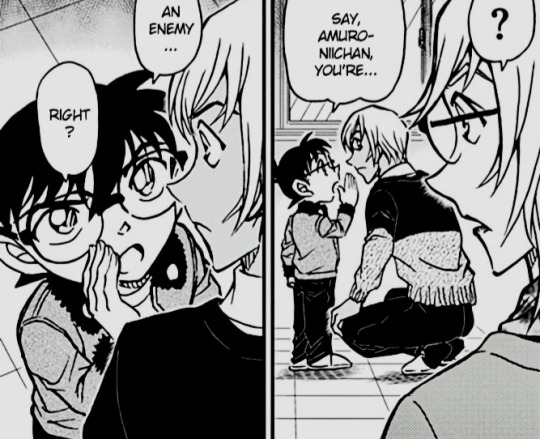
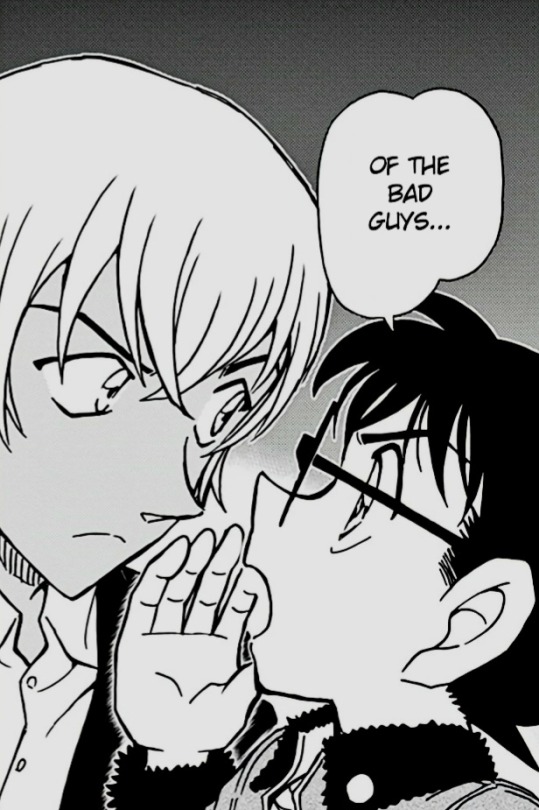
ran has so many reasons to doubt takeshi and shinichi has so many reasons to doubt amuro, but they instinctively know they can trust them. shinichi even feels safe enough to confront amuro, which is incredible, cause my boy takes a huge risk by directly questioning his allegiance.
idk about y'all but i think that's beautiful. it reminds me of an amazing quote from a famous philosopher:
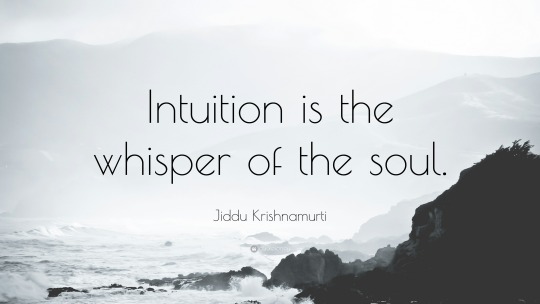
their souls are pure. which is why they're able to recognize that quality in other people and each other.
their optimism
despite all the darkness that shinichi and ran face every single day, they have a really optimistic outlook on life. ngl, their unwavering positivity makes me extremely emotional.
chapter 252
shinichi gets shot by criminals and he's slowly bleeding to death. the detective boys feel like it's their fault that shin got hurt, they blame themselves and feel hopeless. my boy is in pain, he's fighting for his life, he's probably even scared, it'd be more than understandable if he saw their point and regretted the unfortunate situation they found themselves in. but he doesn't:
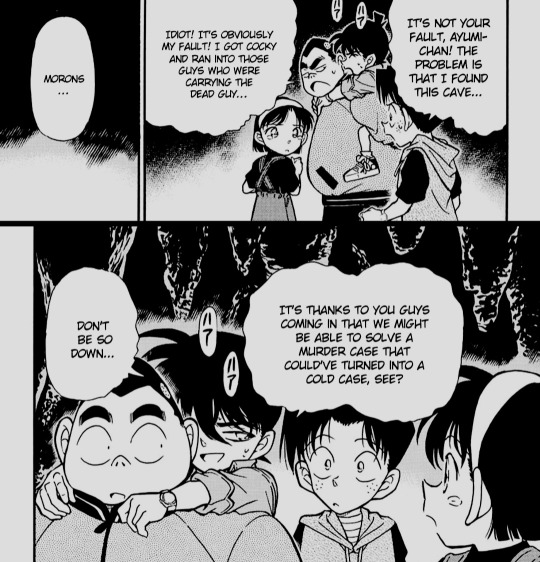
he chooses to look on the bright side. even in death.
which, fortunately, gets the detective boys out of their dark way of thinking. shin helps them understand that, yes, they're on a bumpy road, but at least it's leading somewhere.
chapter 780
shinichi gets a culprit to reveal he's from the kansai region by successfully provoking him with a fake accent, but shin doesn't just piss off the culprit, he also pisses off kazuha and heiji, so kazuha begins to wonder whether people from the kansai region are narrow-minded and ran's perspective is something i did NOT see coming:
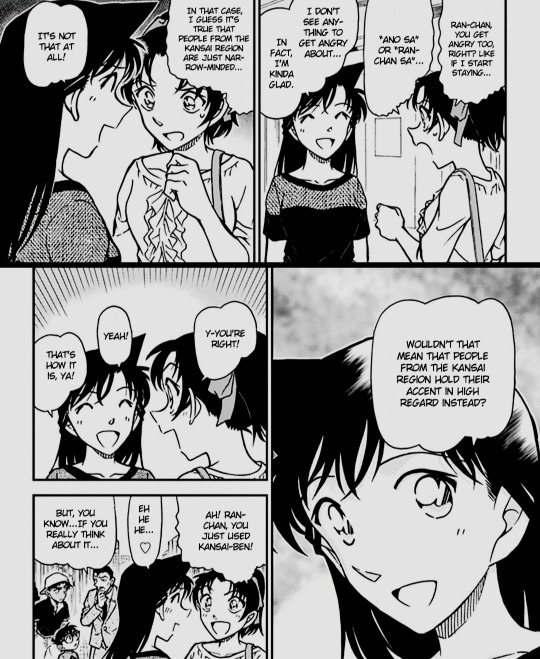
HOW IS IT POSSIBLE TO BE THIS ADORABLE AND WISE?!
just like shinichi ran's able to offer kazuha a surprisingly positive outlook on her concerns, which genuinely makes her feel better.
there are many instances of their unshakable optimism and the effect it has on others, it's really beautiful to examine.
i recommend y'all look into it on your own, cause in this part of my masterlist i merely have the space to touch on shared traits like their great intuition and firm optimism, but now it's time to get into the biggest and most important portion of this analysis!
their idealism
i hope y'all read the disclaimer i've linked at the beginning! if you haven't, i urge you to read it before you continue with this post!
shinrans shared idealism is something i've already mentioned in part two of my masterlist, but there's so much more to say about it:
i'd argue that it's the main thing that connects them. not to shade my own children, but they value justice and human life so much, for most people, including me, it sometimes borders on stupidity.
but that's the thing, shinichi kudo and ran mouri aren't most people.
cause most dcmk characters 1) don't initially share their virtues and 2) question their admittedly heroic but also terribly reckless actions, whereas shinichi and ran support and admire each other because of it. because they're the same.
i'm about to give a few examples of shinichi and ran being the most idealistic characters in the manga and for the purpose of full context, i have to showcase the contrast between shinran's morals and the values of other characters. i appreciate and care about every single character who's brought up in the next part of my essay, so don't take this post as an invitation for hostility towards them, that's not my goal, okay? okay. let's proceed.
a) sense of justice and heroism
chapter 239-240
shinichi impulsively investigates the black organization. haibara repeatedly reminds him that he's being reckless and putting himself in danger, she even mocks his strong sense of justice and initially refuses to join his investigation because she's smart and values self preservation. haibara ends up joining him after all, but keeps urging him to drop his investigation and leave with her.
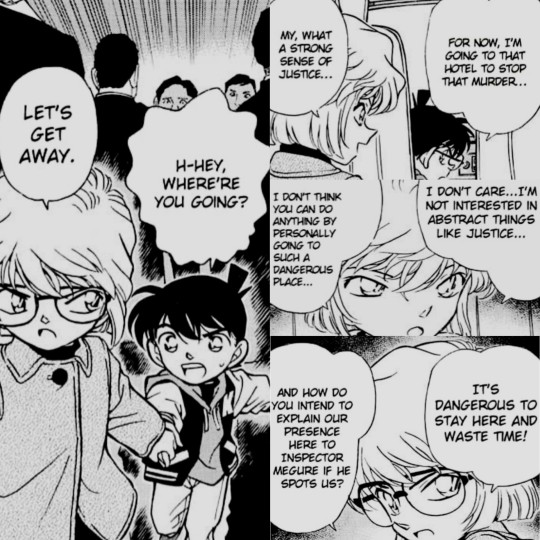
i don't blame her one bit for her approach to the situation... truth be told, her reaction makes a lot more sense to me than shinichi's 😂 but that's because i share her pragmatism.
at this point in the manga shinichi and haibara have zero support. neither the fbi, nor the cia is helping them. it's incredibly dangerous for them to go after the black organization completely alone and it's not just unsafe for them individually either, it's risky for everyone they care about. their exposure would endanger a lot of people, including agasa, ran, kogoro, the detective boys, etc...
and safety concerns aside, why would she care about justice in that situation anyway? how could she, a teen who's trapped in a child's body, possibly hold the black organization accountable without any help?
so yeah, i strongly believe that if you look at the situation logically, haibara's point of view makes a lot more sense than shinichi's and it's fair of her to choose safety over justice, especially when the latter seems so impossible achieve.
too bad that shinichi doesn't give a flying fuck about things like common sense or self preservation. he's completely driven by idealism, it's what defines him as a person, in more ways than one. the only person in the dcmk universe who accurately mirrors his righteousness is ran mouri and it expresses itself through countless parallels that completely contrast haibara's position in chapter 239-240
chapter 44
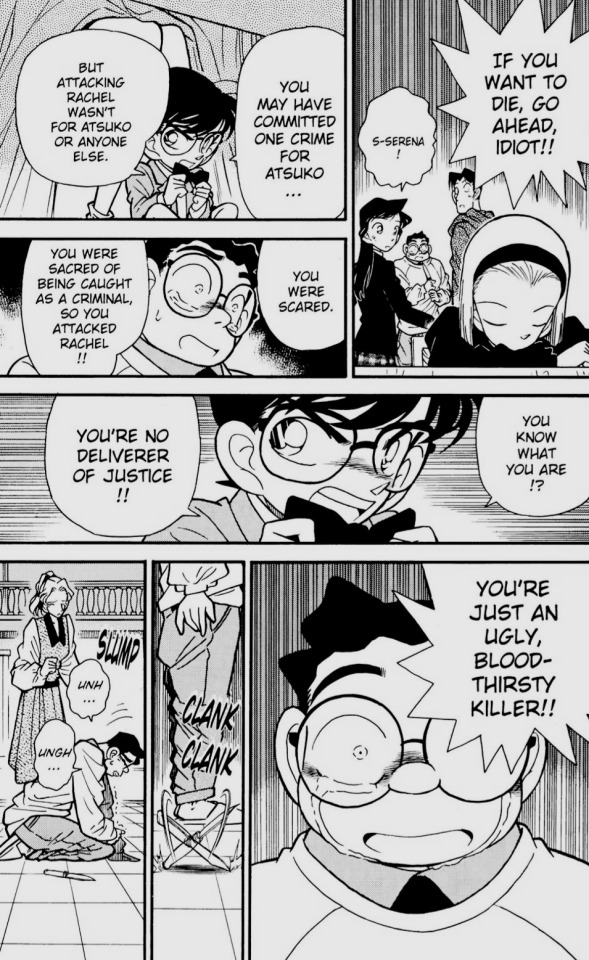
shinichi pretty much lashes out at the murderer for personal reasons which i dive into here. on top of that, he's passionately opposed to the culprit's idea of using justice as a reason for murder and guess what? ran unsurprisingly feels the same way:
chapter 313
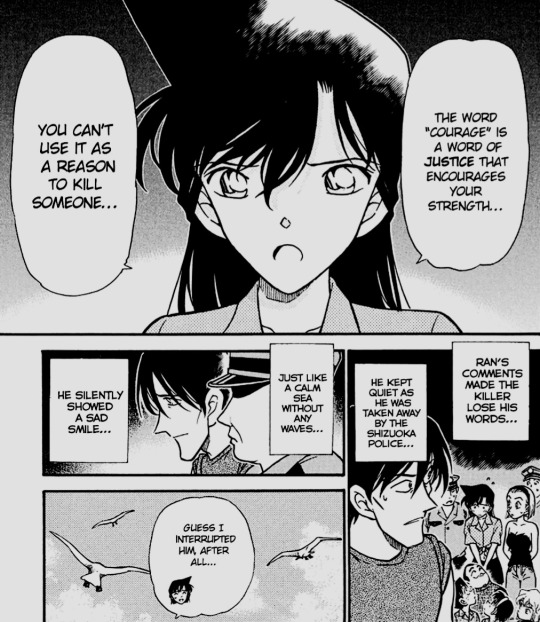
the obvious observation here is that their speeches are remarkably alike, but what i find even more fascinating is the fact that the killers react so similarly. shinran's sense of justice is so powerful, it doesn't just guide their own actions, it even moves morally corrupt people and holds them accountable.
furthermore, the concept of personal safety is completely lost on both shinichi and ran lol.
they constantly risk their lives for other people, including haibara, who, as we already established, initially disregards heroism.
chapter 289
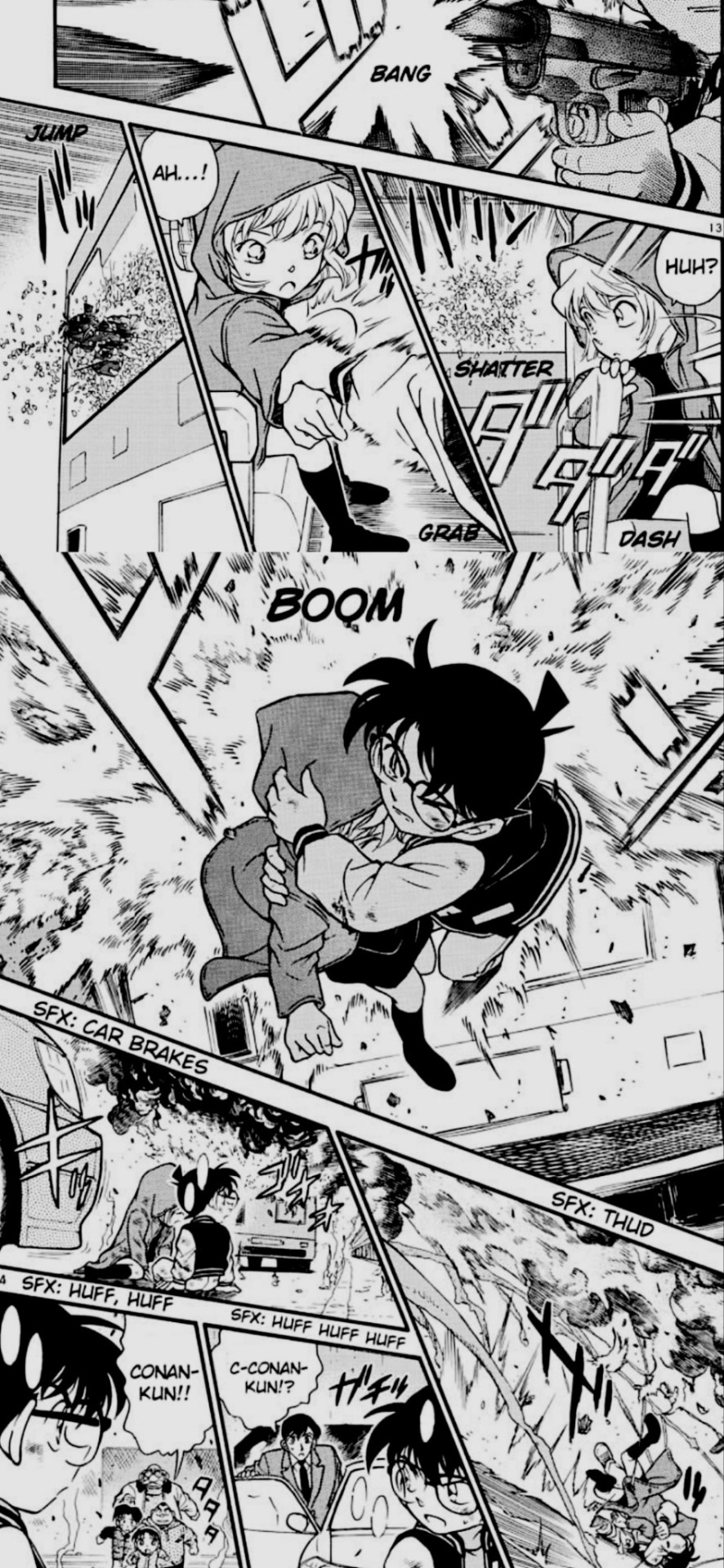
chapter 434
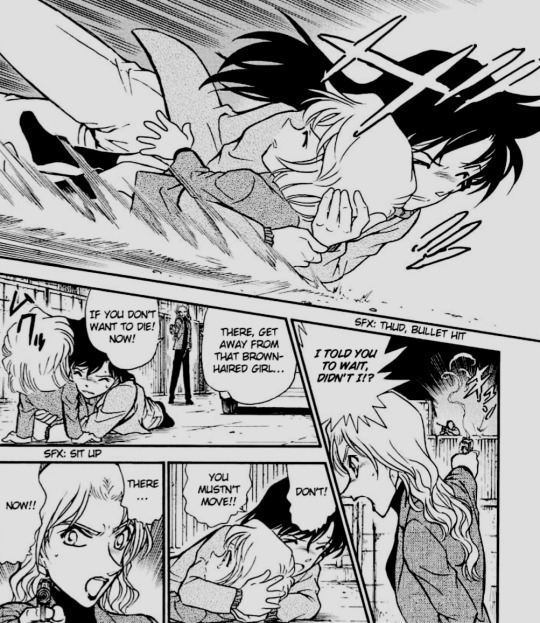
AHHHHH!!! THE PARALLELS ARE KILLING ME
anyway, i'm not trying to undermine the beauty and complexity of haibara's character, she's incredibly well written and i think it's important to emphasize that she's actually attempting to sacrifice herself in both of these chapters.
i actually really appreciate the fact that haibara is this complicated person with a rough background who slowly figures out her values with the help of her friends, imo it gives her layers.
i'm simply pointing out that upon her initial introduction her virtues instinctively differ from shinran's, it takes her some time to grow into the same kind of heroism that shinichi and ran display from the get-go. because they inspire her. but i'll go over that in a minute.
b) they value human life
one of shinichi's main attributes has always been his profound interest in human life. it's a quality that i never questioned until recently because i always figured it was due to his work as a detective.
but the more i think about it, the less it works as an explanation because we know a lot of detectives in the dcmk universe who don't share his interest in protecting people at all costs.
interestingly enough, there is a character who shares his passion but it's not someone who professionally deals with human life - it's just a compassionate, tenderhearted girl who instinctively wants to keep others safe no matter what.
chapter 1026
ran saves a murderer from suicide
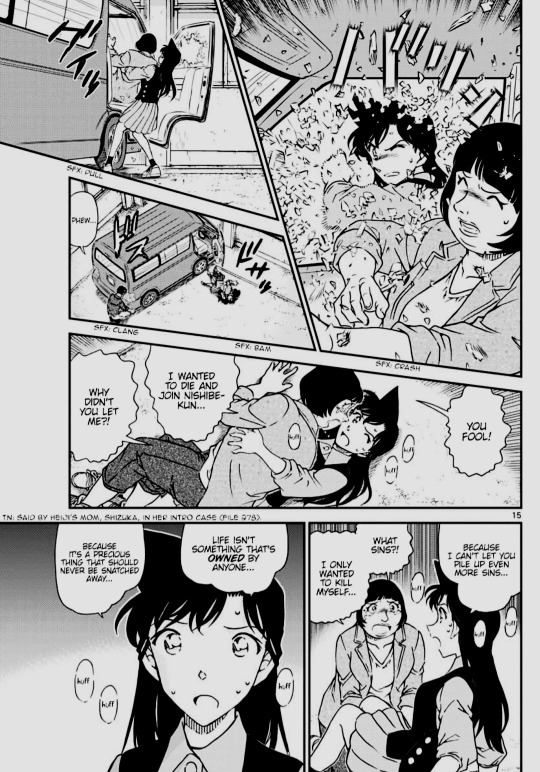
which reminds me of shinichi attempting to do the same in another chapter:
chapter 67
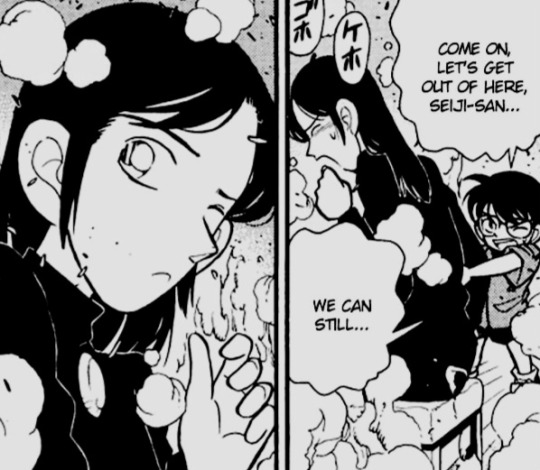
he tries so hard... but unlike ran he ultimately fails.
and who's there to comfort him? who's the only person in the whole world who naturally understands his sorrow, who truly knows how valuable human life is and wants to protect it just as much as he does? ran. of course it's ran.
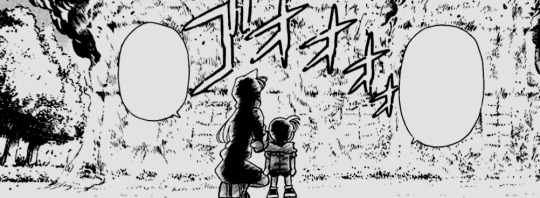
and it will always be ran.
having said that, analyzing shinran's idealism is beyond fascinating to me because i rarely share their virtues or courage. my values are more aligned with the rest of the dcmk universe:
chapter 153
shinichi notices that a culprit is about to kill herself and gets in the way of her plans. heiji's response resonates with me a lot.
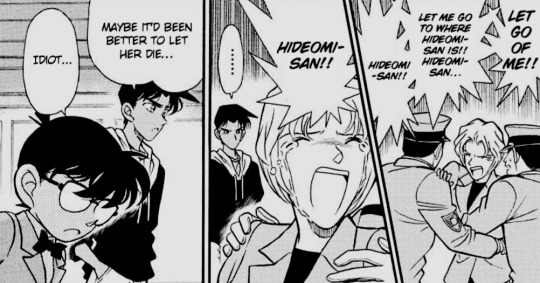
CAUSE YEAH, what's the point of keeping someone alive against their will? isn't that infinitely crueler than just letting them die? maybe.
but shinichi and ran don't give a fuck lol. they don't stop the murderers suicide attempts because they're heartless though. it's the opposite, really.
as we already established, both shinichi and ran are optimists at heart, so they believe or least hope that people can always better themselves. i think that's the main reason why the interfere.
besides, shinichi and ran simply care too much about justice - they need culprits to be held accountable and they respect human life too much to allow suicide.
again, do i share their passionate interest in human life? LOL, hell no. i think very few people are capable of being that idealistic. most people, including me, value innocent life but shinichi and ran? they value life regardless of innocence and on top of that, they even value the lives of people who ARE ACTIVELY TRYING TO KILL THEM
chapter 773
a man is threatening to bomb the detective agency, he could kill ran, kogoro and sera within SECONDS and what does my girl ran do? yeah, she saves his life, LOL!
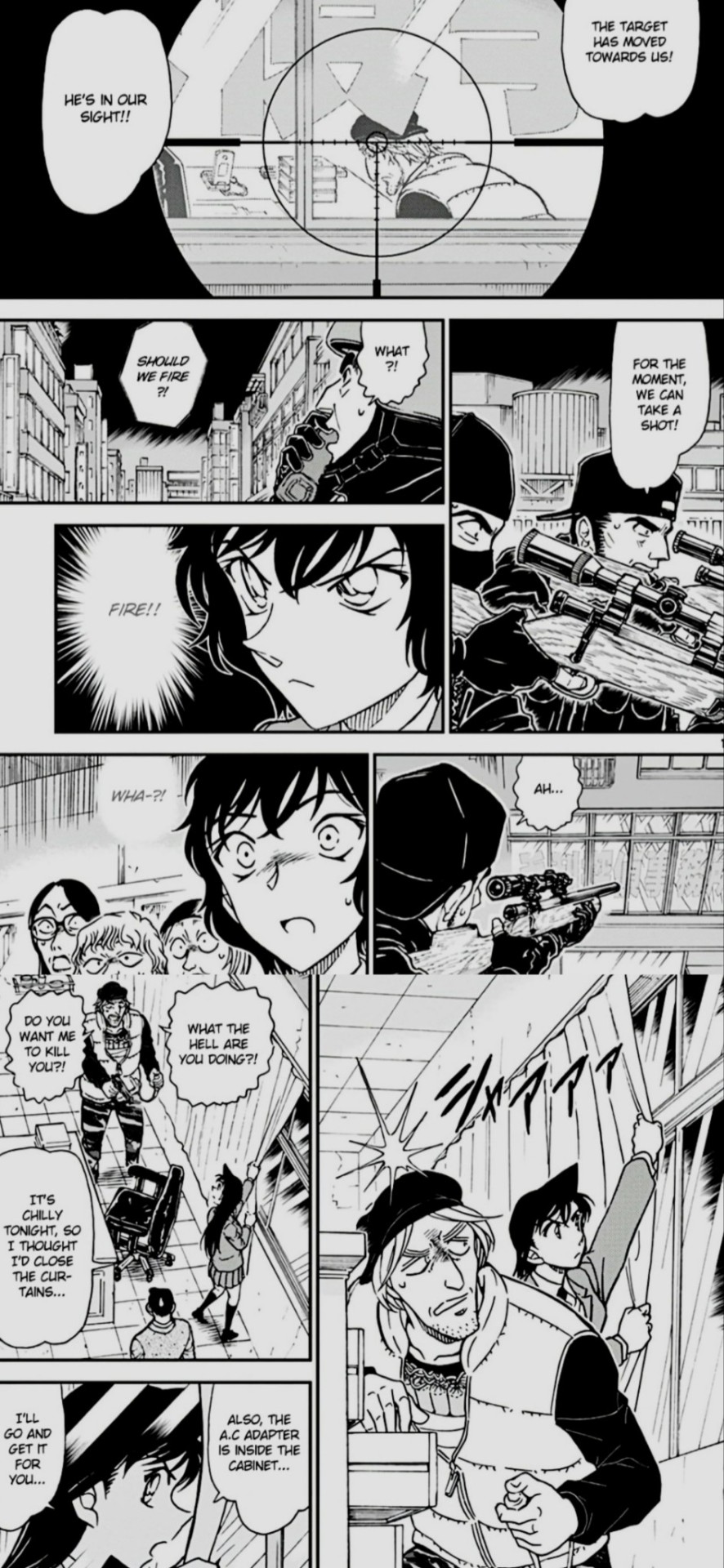
she's already in immense danger and she's seconds away from being saved, but she goes out of her way and puts herself even more at risk, just to save a guy who's threatening her life. WHY?!
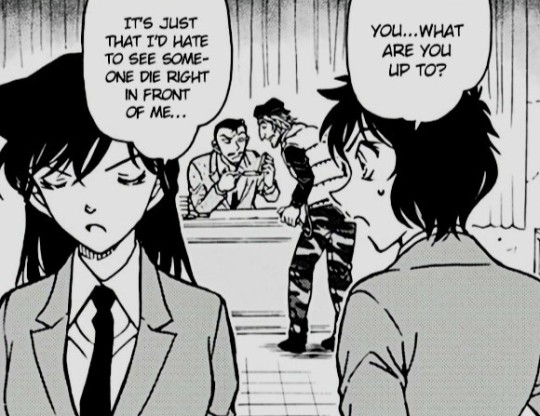
because that's just who she is.
understandably, sera is baffled. she doesn't get it.
which makes sense, cause, again, there's only one character in the entire manga who truly understands ran and passionately agrees with her principles and that's shinichi kudo:
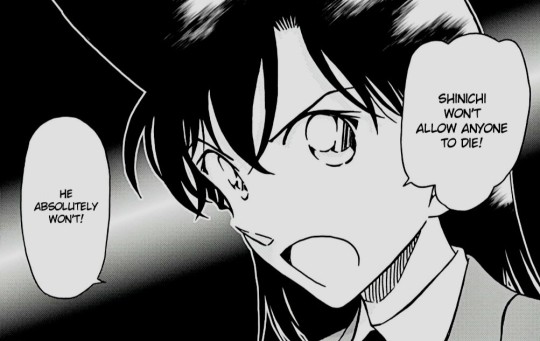
their idealism never wavers. it's perplexing for characters like haibra, heiji, sera and even for me as a reader. it's also extremely inspiring though. which brings me to my next point!
c) they inspire others
chapter 239
remember how haibara initially refuses to join shinichi during his investigation? guess what changes her mind...
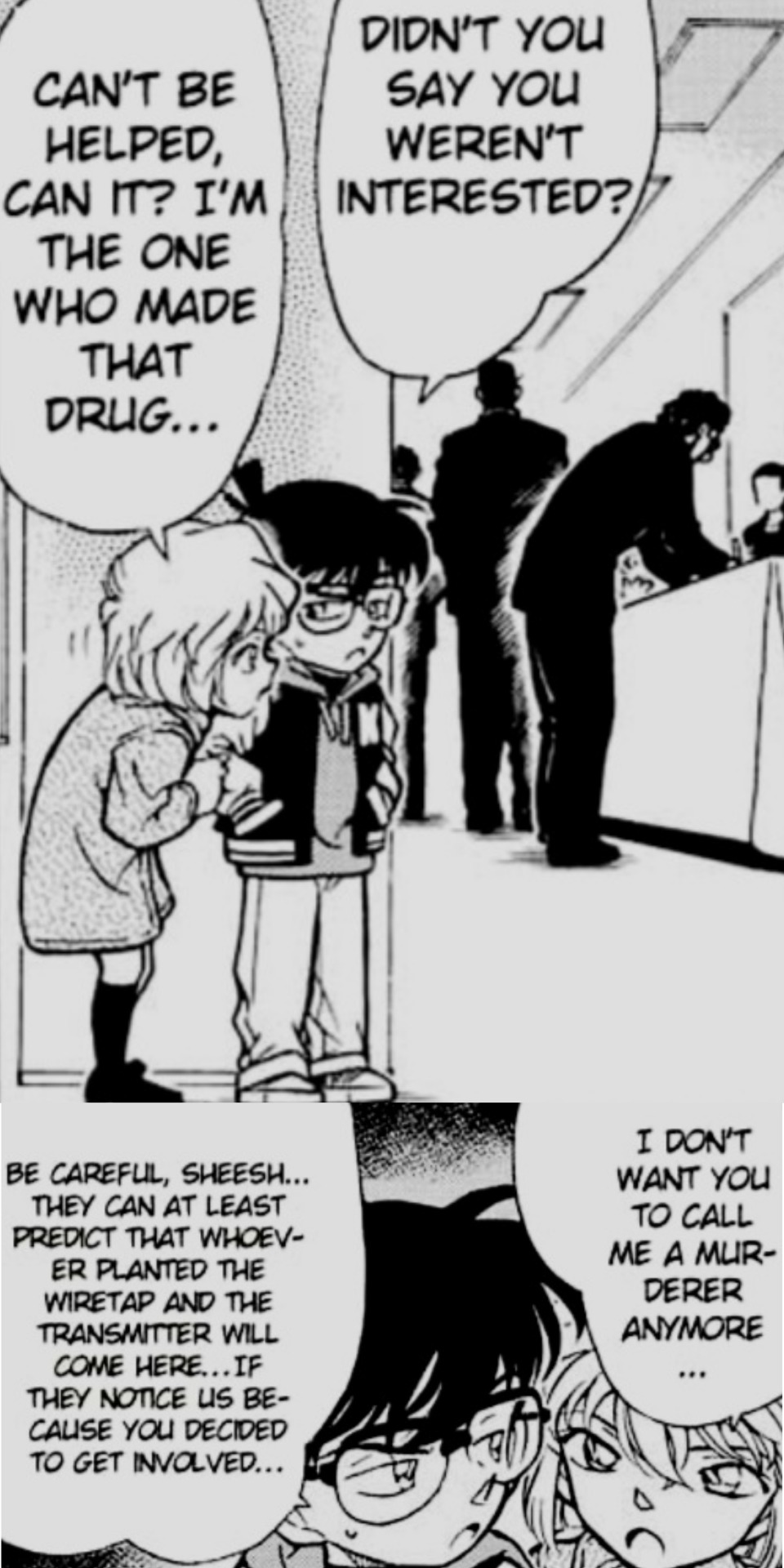
even though haibara mocks shinichi's idealism and admittedly doesn't understand it in the beginning, it does get her thinking.
she grows up under terrible circumstances which force her to prioritize her safety over human life, but after watching shinichi for a while, she comes to the realization that she no longer has to live that way.
his unshakable idealism fascinates and encourages her, she's reminded that she has choices now and suddenly she finds herself wanting to do better.
but shinichi isn't the only person who helps her evolve in a pretty significant way:
chapter 313
ran's speech about justice and courage deeply moves haibara in the same way it affects the culprit.
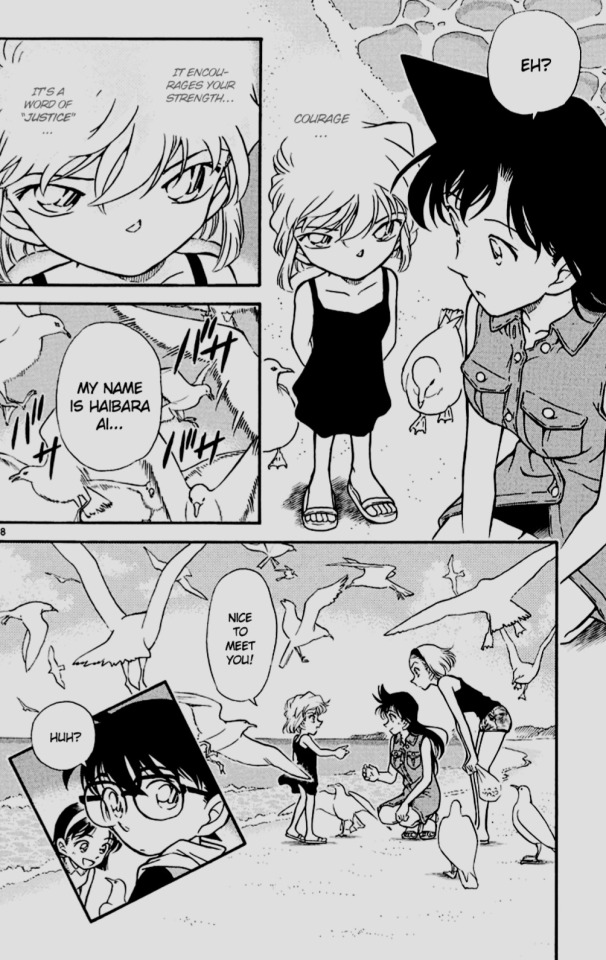
her speech doesn't just give haibra the courage to finally introduce herself to ran after months of avoiding her (for reasons i'll get into in part four of my masterlist) i'd argue it also contributes to her finally facing the black organization in chapter 434
while shinichi helps haibara understand that she has choices now and urges her not to run from her fate, ran motivates haibara to be courageous and face her fate. it's actually incredible how much they help haibara, just by being themselves.
chapter 398-400
check out the blog of my wonderful friend aracaeli who recently brought attention to an extremely underrated chapter which emphasizes that ran doesn't just affect characters like haibara, she even inspires her other half shinichi, which is a remarkable accomplishment, considering their morals are generally completely aligned.
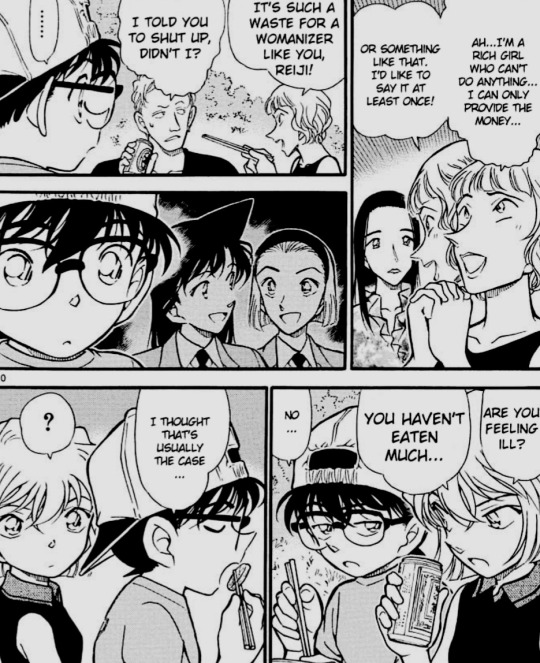
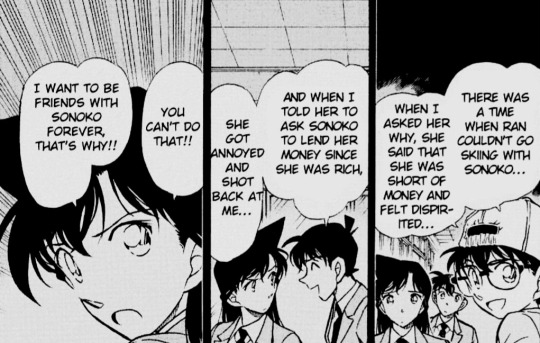
ran's idealism knows no bounds. how could it not move people? especially someone like haibara who's just starting to get familiar with the concept of friendship.
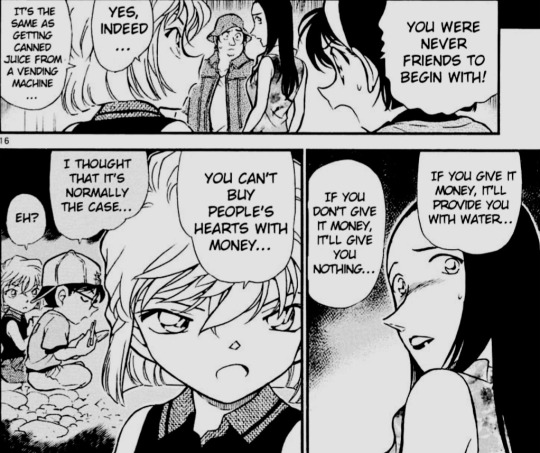
in this chapter ran's idealism inspires countless people (shinichi, haibara, the detective boys, the murderer) it says so much about her character and it's such a touching reading experience.
chapter 153
remember how heiji understandably regrets saving the murderer from suicide after seeing her devastating reaction? shinichi knows exactly what to say:
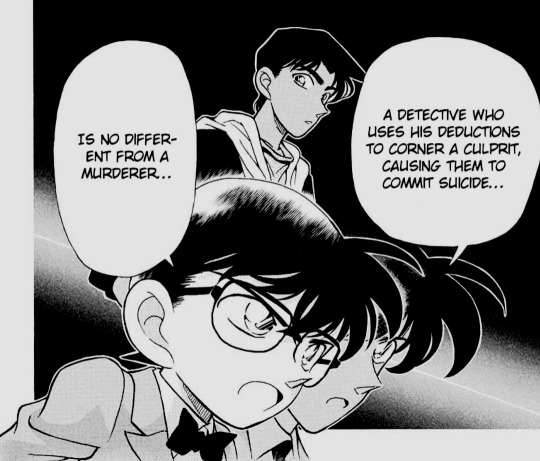
AGAIN, personally, i don't even blame heiji for his initial views. frankly, i agree with them! but it's really hard not to be affected by shinichi's powerful words. i can see how they could completely change the mindset of a passionate detective like heiji. and they do.
chapter 188
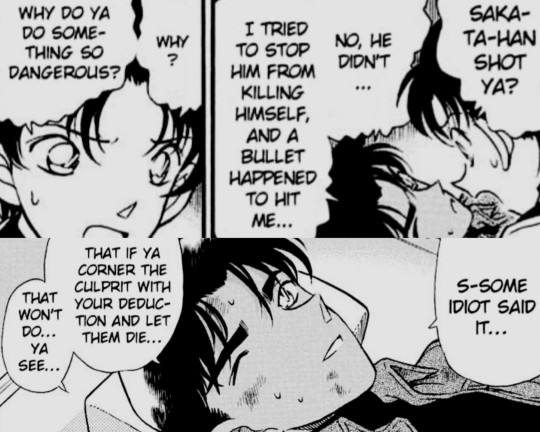
to the point that heiji's willing to risk his life because of them...
chapter 774
even sera, who can be a bit morally corrupt at times, is impressed with ran's strong virtues:
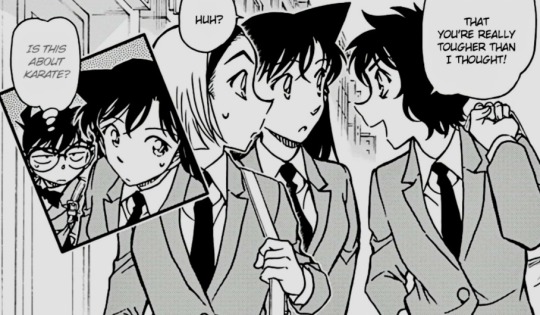
but that's to be expected, considering that shinichi and ran even had an impact on vermouth who's an established, ruthless serial killer.
i know, i already extensively talked about the new york case in part two, but it's such an important chapter for shinran that i feel the need to bring it up again, especially if it's going to continue the wonderful discourse i've been having about it with amazing bloggers like sakublogs who i urge you to check out!
chapter 353
this case is so, so special to me because it fundamentally captures the essence of shinran.
vermouth is about to take ran's life but the railing she is leaning on breaks and she's about fall to her impending doom... until ran intuitively grabs her arm and tries to save her:
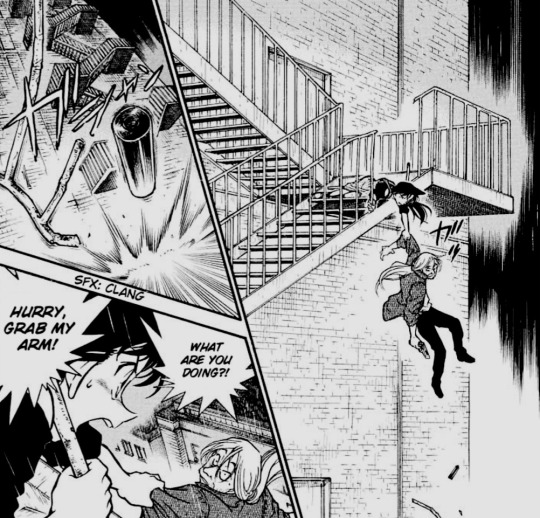
you'd think that shinichi would urge ran to let go, cause that's what any rational person would do, right? but he doesn't. instead he assists ran. again, WHY?
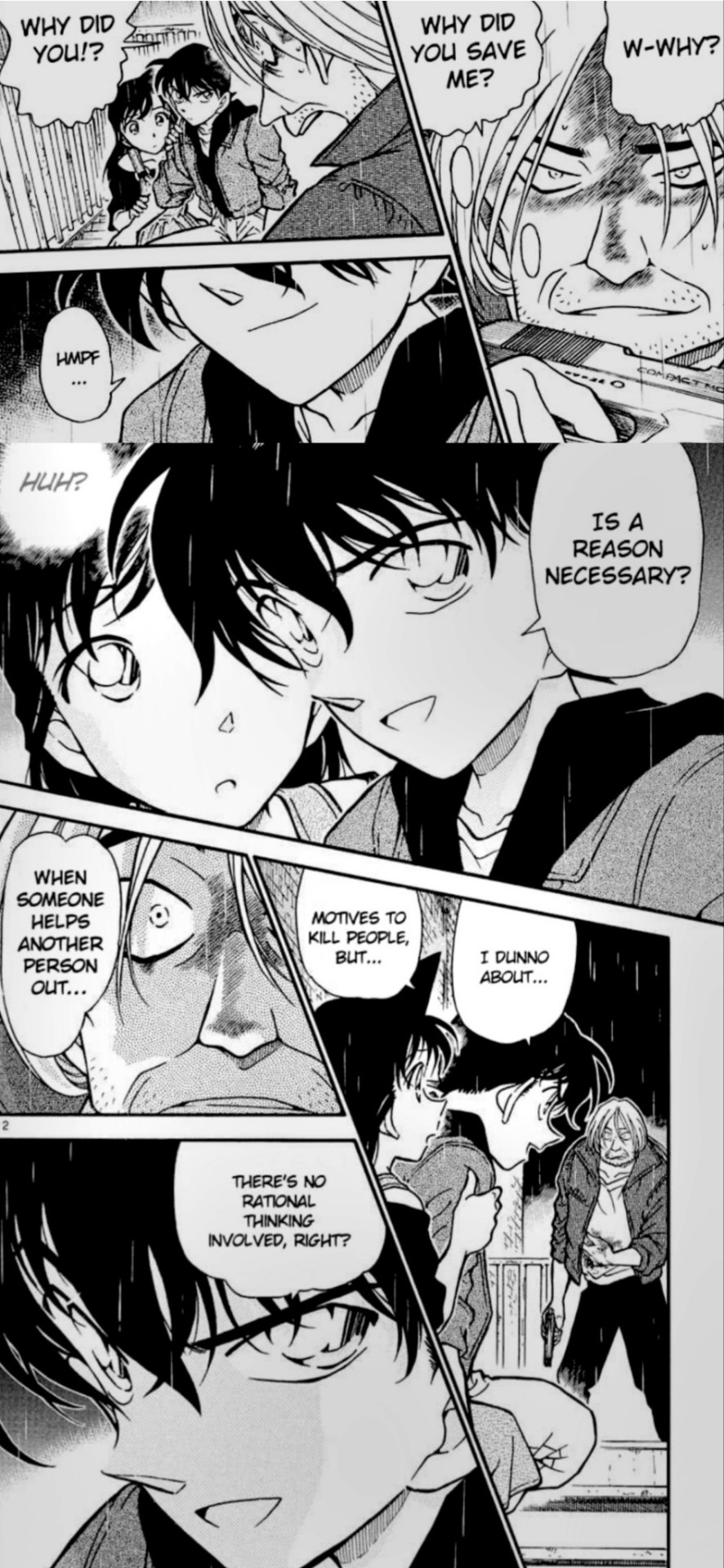
because... they can't fucking help themselves. because THAT'S JUST WHO THEY ARE.
shinichi and ran are completely led by their intuition, optimism and idealism. nobody values justice, courage and human life the way do, it's in their bones and hearts, it's not something they grow into, it's in their nature.
their spiritual connection is their most defining quality as a couple and it's the reason why i'm convinced that shinran is gosho's best written ship and beyond that, one of the most brilliantly written romances of all time.
it's difficult to do shinran justice in condensed essays like this, but i hope i was able to illustrate their amazing personalities and offer some insight into their captivating bond.
it's why i've been closely following their story since my early childhood. they have the same effect on me they have on other dcmk characters. shinichi and ran inspire me, they touch my soul and restore my faith in people. they're not just a cute couple - they're a symbol of hope.
vermouth puts it best:
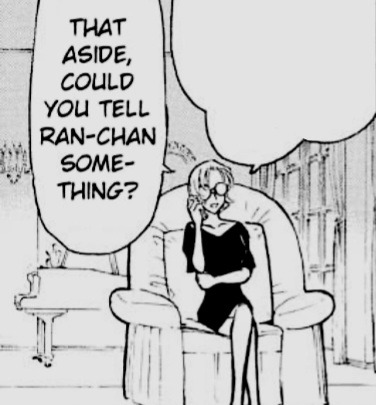

visit the shinran library for more
#angels are not mystical creatures from another realm#they are the manifestations of love and kindness in our lives#deepak chopra#a life changing ship indeed#i love them so so much#part four is going to be my favorite part of the series#hint#it's going to be about my best girl ran#i'm so excited!#shinran#shinichi kudo#ran mouri#dcmk#detective conan#case closed#ship analysis
127 notes
·
View notes
Text
Again and again, Only Friends brings in the many, many perspectives on sex and how people not just related to sex but relate sex to other people.
Boston finds his own value in sex. When asked about more or seeing others seek more, he looks down on it and disparages it or is just absolutely confused by the entire concept. Sex, for him, is utilitarian and pleasure, to be used to get what he wants and to control people and that is what sex is to him. Sex is about control and about pleasure and about his own importance and value and what he can get from people and the only thing he knows to give to people.
Nick is using sex to feel closer to someone he is coming to care about and falling in love with him through sex and hoping for more but never able to fully articulate what he wants so turning back to sex again and again to try to find what he wants only to realize that sex isn't what he wants here but he isn't getting anywhere with it either... but without it he has nothing of what he wants.
Sand is facing down his own rules about sex and friendship and relationships. He is looking straight at his own feelings and try to both face them and hide from them at the same time. He's playing with fire and he knows he can't control it, he knows he's losing the tenuous hold he had on his feelings, but he can't admit it because admitting means he will genuinely stop himself and pull away from Ray and he doesn't want to pull away from him. He wants to love him.
Ray has been using sex as an escape from his own feelings, just like he drinks to flee himself as well. But he also has an abiding and longlasting crush on Mew that has kept him from falling in love or acknowledging other people in his heart, even people he could have loved. He uses sex as an escape and even with Sand, who is definitely catching feelings for, he does not know how that face that part of himself because that part of himself has never felt worthwhile. He loves Mew without a chance or hope but he loves and loves and loves him and drops everything for him because that love for Mew feels better to him, that hopeless love is easier to handle than anything he'd have to work for.
Mew does not have sex. This is one type of control that he has, not having sex and drinking less than his friends. That's what he does. That's how he finds part of his identity. He chooses not to do what his friends do, to control himself, to watch them 'waste their lives' while he controls himself and feels in control, feels better about his choices, knows that he is making the 'right choice' over them. He wants his sex to look different than his friends, nothing casual, an entirely different kind of control than Boston and a different kind of escape than Ray.
Top is the one we can't be as sure about yet. He seems to treat sex as something that is simply... there. Possibly part of trying to make sure people are sleeping beside him at night. But all we've seen of him actually having sex is always in places that look deeply uncomfortable and is always entirely devoid of an emotion. He turned Boston down at the bar but still goes ahead with the sex twice after that. Top seems to have little to no control once it comes to sex. He won't act on his urges but he won't turn people down entirely either, not once they're offering him something he wants. Which is why the idea of him turning Mew down next week is beautiful. I would like that.
Sex is about control and desire and love and need and want and escape and every single character uses it differently and that's what makes the entire show so fascinating.
(I also posit that Boston and Mew are opposites, Sand and Ray are opposites and Nick and Top are opposites and that's why Sand and Ray are the couple most likely to actually work out in the show in my opinion. Everyone else has crossed wires across two relationships while Sand and Ray are just internally fucked up more than anything else.)
#only friends#only friends the series#only friends meta#only friends series#thai bl#thai drama#bl drama#bl series#thai series#thaibl#asianlgbtqdramas#asian lgbtq dramas#thai bl series#thai bl drama
146 notes
·
View notes
Text
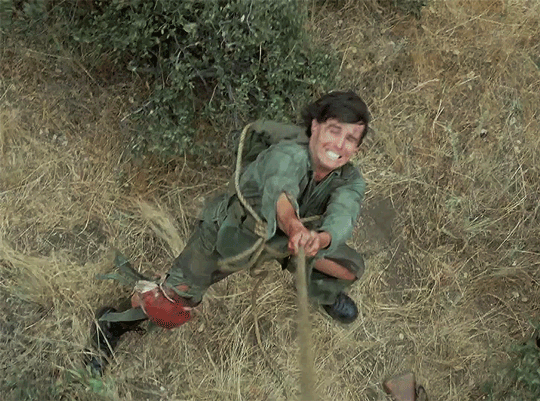
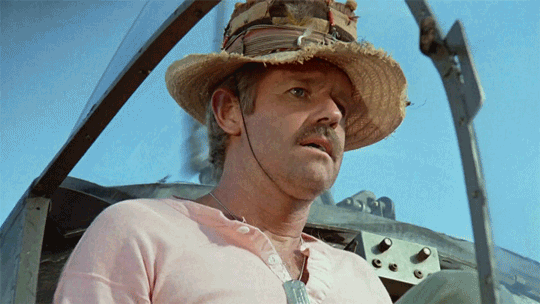
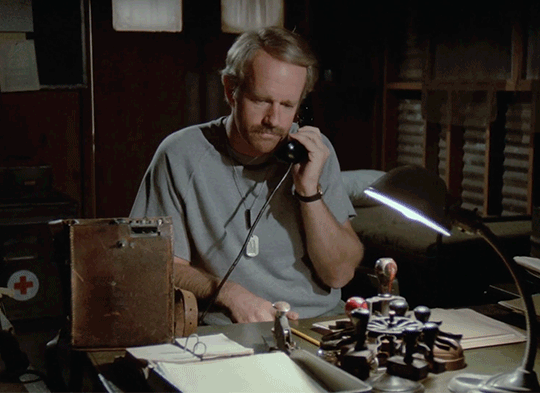
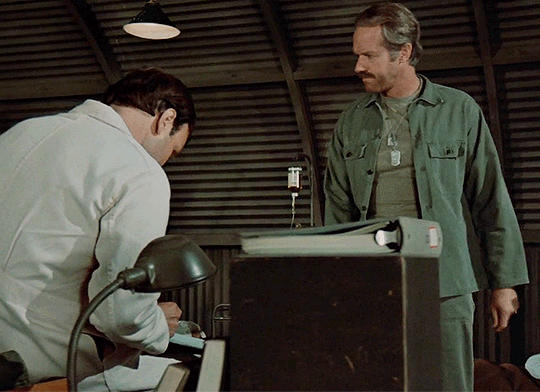


The minute I cut that rope they made me a soldier.
MASH Season 11, Episode 6 — Bombshells
I used to post practically every week about s11e06 Bombshells because it's my favourite BJ episode and the one I find most fascinating, because BJ seems to frequently think that it's BJ against the world, and Bombshells is a rare example where I think this is narratively true. At last, here are my lengthy but decently articulated thoughts about this Very Special Episode (to me!).
BJ has this "lone wolf" view of himself because he either imagines he has nothing in common with the people around him and therefore it's hard for him to relate to them, or he actually has a hard time relating.
Aside from Potter, who is hardly his peer, and Frank who is The Worst and also leaves two seasons into BJ's run, BJ is the only main cast member who has a wife and/or child waiting for him at home. He's in a different stage of his life than anyone else, and he lashes out at Hawkeye and Margaret at different points claiming specifically that they can't possibly understand what he's going through by being in Korea, away from his family. But for a few differences in their personalities, their world views, and I suspect their class backgrounds (though the latter two are open to interpretation), Trapper might be the character whose civilian life and role on the home front most closely resembled BJ's, and they should kiss about that tbh.
Relatability is important to BJ. We see that through the tension created when he feels his friends 'can't relate' to what he's going through to the point that he gets upset if they try to tell him they understand how he feels. We also see this through how he bonds to people from similar walks of life, for example, the patient in Death Takes a Holiday.
Some of this is just normal human behaviour. It makes sense that BJ would relate better to people who share the same values as him, and a wife and children are symbols of those values. Of course, that doesn't mean we can't or shouldn't connect with people who have different lifestyles with us. BJ obviously does do that, although he doesn't stop wanting relatability and that can make things rocky for everyone involved. What I'm trying to say is, BJ isn't as alone as he seems to feel he is. In fact, it's kind of funny how not-alone he is, sharing a tiny tent with Charles and Hawkeye, which naturally causes tension between the three of them. And the fact that he relies very heavily on Hawkeye's support throughout the show.
But in Bombshells, he's really, properly alone. Early in the episode, he'd been giddy to get away from the camp and everyone in it to spend a day by himself, fishing peacefully. Then the most harrowing thing to ever happen to him onscreen happens, and Hawkeye isn't there, as he so often is, to shoulder it with him. All BJ has is a total stranger who gives him an impossible task that goes against pretty well everything BJ believes in, to a fault. A doctor forced to cause someone's death - imo, I think this moment is equally as traumatizing for BJ as Hawkeye's moment on the bus in Goodbye, Farewell and Amen. BJ, who couldn't get on board with Hawkeye's plan to do a medically unnecessarily surgery in Preventative Medicine — even if it meant they had a chance to prevent the further injury or deaths of dozens of patients — is forced to cut a man's life line. It's a devastating moment and I have a lot of sympathy for him.
I know BJ well enough at this point that I don't expect him to voluntarily reach out to anyone for help, but interestingly, his isolation is even mirrored by the B-plot. We get an unusual Hawkeye-Charles team-up, where they run a scam reminiscent of the ones Hawkeye and Trapper used to pull, duping the whole camp for funsies. It's not just that normally HawkBeej are the unit to Charles' lone-wolf, it's that Charles and BJ's roles are reversed here even in the tone the plots take: CharlesHawk are doing something frivolous together, while BJ pursues a serious plot - now it's possible my memory may be failing me, but I can't think of another episode that replicates this formula. One specific example of these plots playing off one another as the A/B plots regularly do on MASH: BJ makes a phone call to try to figure out if the man whose line he cut might've survived, while Hawkeye and Charles make a phone call to see if they can contact Marilyn Monroe, the star of their scam.
In typical BJ fashion, when Potter tries to ask if everything's okay, BJ pulls away and acts like everything is fine, but this time it's because he has a plan and he wants to see it through on his own, rather than just sit by himself feeling powerless. He even tells Potter he'd like to try another fishing trip — trying to catch the one he'd cut loose the day before. He does all of this on his own checking beds, asks around, flings open the doors of the ambulance trying to see who's inside — but the fact that these scenes are interspersed with the B-plot, this would make an interesting montage, which is the thought that inspired the gifset I made. It matters less to me why he's doing it and more that it's a rare instance of him doing it on his own.
If he thinks that's because no one can help him, the episode doesn't really argue with his assumption. Hawkeye can tell that something is off, but despite his efforts, BJ keeps himself out of reach. I do not like the position the narrative takes at the end, when BJ tells Hawkeye that they, as surgeons think they're "self-righteous" and better for thumbing their noses at the estabilshment - I think that's a pretty dishonest way to characterize everyone at the 4077th including BJ and an straight example of MASH's unfortunately centrist leanings in the later years.
But despite my problems with that messaging, I still like this episode for it being about BJ and his resolve, detached from those around him and detached from the other big part of the BJ character - his family. All the other big BJ episodes - Period of Adjustment, War Correspondent, Death Takes a Holiday - feature his personal relationships in a big way that drives the plot. Bombshells is an episode that promotes BJ to protagonist, demoting other characters who might otherwise play a role in the drama.
This is most striking to me when even Hawkeye is unable to reach BJ and plays no role in the resolution of the A-plot. He sympathizes with BJ and tries to comfort him with "Well you didn't have a lot of options" - that may be compassion from Hawkeye, but I think it probably sounds dismissive to BJ, and that puts them in an odd role-reversal: BJ in crisis, and everything Hawkeye says is cold comfort to him. Finally, Hawkeye resigns himself to the feeling that he can't help BJ with this and so he leaves when Margaret comes to get him.
I'm not especially fond of the way BJ resolves the plot by giving away his medal and is then shown to be somewhat at peace with that, not because I fault BJ for it, but because I take issue with the broader practice and so does the show on many an occasion. What's important to me is that BJ also does that completely on his own — tie-up the plot.
I could probably go on about how much I disagree with the messaging of this episode, how much I detest the show taking a shot at it's own formerly anti-establishment beat and how that actually does the BJ character a disservice, but I'm not going to here because it's not as important to me as the unique format of this episode.
Bomshells is no s04e19 Hawkeye, but I really appreciate having so much textual stuff to chew on for BJ, rather than having me sit here and try to interpret the inconsistent writing that the writers admitted to for BJ, or Mike Farrell's acting directions. You could say this about a lot of characters, but BJ really deserved to be given the opportunity to stand on his own two feet more often.
#bj hunnicutt#mash#m*a*s*h#re: mash#beej meta#s11e06 bombshells#maybe now i can finally chill tf out about this damn episode#probably not tho <3#majorbaby.gif#had to get my nod to MY beejtrap leanings in there 8D
169 notes
·
View notes
Text
By: Rob Henderson
Published: Apr 25, 2024
Perhaps counterintuitively, gender equality is leading to greater gender-related differences.
In most wealthy nations, women have been steadily closing the gap with men on several fronts. In the United States, women now earn the majority of the bachelor’s, master’s, and doctoral degrees. Women now receive more than half of STEM college degrees, and the proportion of women in the tech sector has risen in recent years, to 35 percent in 2023 from 31 percent in 2019. Among Americans younger than 30, women’s earnings rival or even surpass men’s in many metropolitan areas, including Boston, New York, Los Angeles, and Washington, D.C.
As these gaps have narrowed, we might have expected men and women to become more alike in other ways, including their cultural values and politics. Yet we are seeing the reverse.
This is especially true when it comes to political orientation. Recent polls have highlighted increasing polarization along gender lines on various political issues. Since 2014, women younger than 30 have become steadily more left-leaning each year, while young men have remained relatively static in their political views. In 2021, 44 percent of young women in the United States identified as liberal compared with just 25 percent of young men — the biggest gender gap in 24 years of polling.
In the Financial Times, John Burn-Murdoch recently articulated this stark contrast in a piece titled “A new global gender divide is emerging.” He observes that while older women and men are similar in their political views, young women have veered sharply to the left of young men.
Burn-Murdoch cites the influence of the #MeToo movement, suggesting it empowered young women to address longstanding injustices.
The Washington Post’s editorial board suggested that such polarization is to be expected in the United States, “a large, unwieldy democracy.” The Guardian proposes that digital spaces and social media influencers are luring young people into disparate online platforms that cultivate more extreme political views. No doubt these all play some role.
However, I’d like to propose an idea from my home discipline of academic psychology: the gender-equality paradox. This emerged as one of the most mind-blowing findings that researchers published while I was pursuing my recent doctoral studies at the University of Cambridge.
The paradox is straightforward: Societies with higher levels of wealth, political equality, and women in the workforce show larger personal, social, and political differences between men and women. In other words, the wealthier and more egalitarian the country, the larger the gender differences.
The pattern exists not just for political ideology but also for things like academic preferences, physical aggression, self-esteem, frequency of crying, interest in casual sex, and personality traits such as extraversion. In all these categories, the differences have been largest in societies that have gone the furthest in attempting to treat women and men the same.
Of course, there is an overlap for all of these attributes — aggression, for example, is a trait that both women and men can exhibit.
But there’s less overlap — meaning greater differences — in more-equal societies. In China, which scores low on gender parity, the overlap between men and women in personality traits such as extraversion and openness to experience is actually very high, 84 percent. In the Netherlands, which is among the most gender-equal societies, the overlap is just 61 percent.
More recently, a study of 67 countries found that although women generally tend to hold stricter moral views, gender differences in verdicts in hypothetical court scenarios are largest in wealthier and more equal societies. Specifically, women view misconduct more unfavorably than men in most places, but this difference in judgment is larger in richer and more equal countries.
This gender gap has also been found for physical differences in things like height, BMI, obesity, and blood pressure. Across societies, men tend to be taller, heavier, and have higher blood pressure than women. But in rich and relatively equal societies, gender differences are particularly large.
The gender-equality paradox might also help to explain why the gender gap in political orientation has grown among young people. One natural explanation is that young women are outpacing men in higher education, with men now making up just 40 percent of college students. Some evidence suggests that college tends to cultivate more liberal attitudes.
However, even among college students, women are more left-leaning than men. A Foundation for Individual Rights and Expression survey of 254 colleges and universities found that 55 percent of female students identify as liberal, compared with only 40 percent of male students. Interestingly, at schools ranked below 200 by US News and World Report, 45 percent of women and 33 percent of men identify as liberal. At top 25 schools, though, the difference is more pronounced, with 71 percent of women and 54 percent of men identifying as liberal.
The gender-equality paradox can help to explain why the gender gap is largest at the most selective US colleges, where family income tends to be higher and sociopolitical equality tends to be especially highly prized.
In an interview in The Times of London, the psychologist Steve Stewart-Williams succinctly summarized the paradox: “Treating men and women the same makes them different, and treating them differently makes them the same.”
There are a variety of possible explanations for the gender-equality paradox, but one prevailing view is that as societies become relatively more prosperous and equal, people more fully express their underlying traits and preferences.
Of course, culture matters in explaining gender differences — just not in the way most people think.
In less affluent and less egalitarian societies, gender differences in physical traits are flattened due to scarcity — that is, the absence of food and other resources stunts growth, especially for men, leading to smaller physical disparities. Moreover, gender differences in psychological traits narrow in response to rigid social expectations.
In the most equal nations of the world, it’s not harsh gender socialization by parents and media, strict societal expectations, or institutional forces that widen the differences between men and women. In the absence of dire poverty and strict social expectations, people are in a position to express their intrinsic attributes and preferences.
The freer people are and the more fairly they are treated, the more differences tend to grow rather than shrink. Thus, we shouldn’t be surprised that Gen Z men and women are diverging along political lines to a greater extent than earlier generations did.
Rob Henderson has a PhD in psychology from the University of Cambridge and is the author of “Troubled: A Memoir of Foster Care, Family, and Social Class.”
[ Via: https://archive.today/zzoqm ]
--
Abstract
Men's and women's personalities appear to differ in several respects. Social role theories of development assume gender differences result primarily from perceived gender roles, gender socialization and sociostructural power differentials. As a consequence, social role theorists expect gender differences in personality to be smaller in cultures with more gender egalitarianism. Several large cross-cultural studies have generated sufficient data for evaluating these global personality predictions. Empirically, evidence suggests gender differences in most aspects of personality-Big Five traits, Dark Triad traits, self-esteem, subjective well-being, depression and values-are conspicuously larger in cultures with more egalitarian gender roles, gender socialization and sociopolitical gender equity. Similar patterns are evident when examining objectively measured attributes such as tested cognitive abilities and physical traits such as height and blood pressure. Social role theory appears inadequate for explaining some of the observed cultural variations in men's and women's personalities. Evolutionary theories regarding ecologically-evoked gender differences are described that may prove more useful in explaining global variation in human personality.
==
For reference, "liberal" is used here in the American sense of "left-wing," rather than the sense of classical liberalism.
https://en.wikipedia.org/wiki/Liberalism
Liberalism is a political and moral philosophy based on the rights of the individual, liberty, consent of the governed, political equality, right to private property and equality before the law. Liberals espouse various and often mutually warring views depending on their understanding of these principles but generally support private property, market economies, individual rights (including civil rights and human rights), liberal democracy, secularism, rule of law, economic and political freedom, freedom of speech, freedom of the press, freedom of assembly, and freedom of religion, constitutional government and privacy rights. Liberalism is frequently cited as the dominant ideology of modern history.
Much of what constitutes modern day "leftism," such as Critical Theory, modern "color conscious" conceptions of "antiracism," and gender ideology is extraordinarily illiberal.
#Rob Henderson#gender differences#left wing#right wing#conservative#progressive#the left#the right#gender polarization#political polarization#religion is a mental illness
10 notes
·
View notes
Text
ON THE AI ART THING
i see three main points people are making, which i think are fair: first the supposition that the products of people's labor are being used somewhere in the process of art generation in an unfairly profitable way; second the supposition that the products of the artists' labor are being stolen before they can sell it; third that the other two result in a chain-reaction down the line where nobody's an artist any more because neural networks are adjective-er than humans.
for what its worth the way AIs combine images is just not the way you think AIs combine images. machine learning is complicated. neural networks are complicated. read up on GANs; watch a few Two Minute Papers videos (like this one, which is particularly relevant: https://www.youtube.com/watch?v=FCf8OA4GPvI). the way they combine im its not forgery (AI are not perfectly replicating your piece and selling it as it is for their own value; at some point it might involve copying/"looking" at it), its not stealing (you still have your art with you), its not even Youtube Poop remixing. generally the hypest way to do neural networks right now is to take a collection of items the AI knows to contain similar concepts and creates an understanding of that shared concept; a good dataset will be big enough to understand all the full variations of that concept, or accurately deduce the rest of the variations, all through the natural inconsistenties that a bunch of pictures of the same thing might produce. an AI knows how to do an oil painting style because it probably knows quite well the actual qualities of an oil painting. it also knows what the sun looks like, how cloth drapes at different weights, how holes in the ceiling of a building might imply shafts of light illuminating on the floor, and other incredible stuff. beats me how it does that, and you likely won't get it either. but the point is the way people are talking about AI on here seems solely informed by imagination.
for unfair and stealing bit, there's something to be said about how certain online communities, websites, people, blogs. etc are naturally private due to obscurity while also being technically completely public; like caves hidden in valleys that take quite a bit of looking to get to and see. in the past we just assumed they would stay hidden: the art on this blog will only be seen by its followers, or people i link the blog to, surely; ill teach you the way to my little cave. unfortunately the internet has been filled with extremely informed and skilled valley-treading and cave-finding robots, and unless you have big ol' signs that say "DO NOT FIND THIS CAVE!" (i remember for forums you could stop scrapers from coming to your website, i think on tumblr there is something like a "do not show in search results" button too), or somehow otherwise avoid their path using strange internet tricks or complete luck, they will totally find your little cave and rummage through it. what i mean to say is this: your art is already part of the publicly available data, and you're in a tough spot to do anything about it. i have no solutions.
the objectionable part is not in this collection of references for analysis, nor in how the AI is usually interpreting what objects are what, but the misuse of the AI to produce things you don't like (which is part of the point i wanted to make in my first post, besides arguing for the artistic integrity of what the AI is doing with its sources). and i see how it seems unfair -- someone smarter and more knowledgeable about art, labor, intellectual property, and value could articulate this more -- that a customer of a neural network could so freely replicate someone else's work with the original stylist having nothing to show for it. it wouldn't be any better if a sufficiently skilled person was requested to draw original pieces in your style. so in that way this is less about AI and more an objection against the violation of someone's intellectual property, if that exists.
for the second point on losing artists, i understand the reasoning as following: nobody wants to be a starving artist, and to avoid that in capitalism one needs money, and if someone is dead set on being an artist (or for some reason can be nothing else) they must sell their art to make money. if no one is going to give them money for art, they will certainly be a starving artist, which we don't want. the conclusion here is, if we want artists (starving, at the very least), we should restrict anything else that makes art which might compete with the artist's. okay, that might work: we could stop having AI make art. but what if, despite our best efforts, we can't fully restrict such a thing? what if AIs are here to stay? more importantly, what if artists are actually already partnering with AI to make art, and you've just been none the wiser? What if you yourself could adapt to new technology and use it to better your own art? The improvement of this tech is, as far as anyone can tell, inevitable. Like any tool, it will be applied in obvious and creative ways. It will displace some people, it will be used by others, and further it will be ignored by the rest.
naturally we would think at least some artists could no longer be paid for what they currently do. if companies can afford a concept artist they likely could better afford a subscription to DALL-E. If their work is no better than AI and they cost more it seems clear they're out. but im simply not jumping to the conclusion that companies specifically will be replacing ALL artists with AI, since most trained artists are in fact better than AI, and come with the human factor. some companies will certainly try the switch to AI for the novelty of it, two or three might succeed, most will probably find out negotiating with an artist or two for long term projects is much easier than talking to the team of computer science geeks to see if the damn art-generating program will churn out something slightly more [quality], more palatable to today's changing tastes -- all that, IF "AI generated images" is even the zeitgeist in whatever hypothetical time period in the future this is happening. maybe by the time the tech is developed people will think handmade stuff is popular and companies will follow suit, with all their logos or whatever being painted on glass panes.
i mean, who are we even talking about, considering artists? the fandom artists definitely aren't disappearing because of neural networks. all those millionaire furry artists simply won't lose business because people are going to Midjourney and entering in "shirtless anthropomorphic tiger, [famous furry artist]-style". people who want oil paintings want some physical oil paintings and usually not a digitally-generated oil painting printed on canvas. people want a human intermediary for basically everything, and if you've ever worked retail with an older customer base you'd know that's true. id certainly prefer human-made art to neural networks if i was gonna spend money (and i apologize to our future robot overlords for such a statement).
so who is really completely losing out here? many artists are, quite frankly, not big enough to get fried. concept artists for triple-AAA shooters might take a hit, i imagine; its decently easy to generate generic cities and alien landscapes with AI. but frankly, artificial intelligence is a tool, and not a scooch-along robot replacing your cubicle in the office. you still need people who know about art, and artists willing to put in the work, for it to produce anything of commercial value. even if it gets so good that the CEO of a business can log on to ARTIFICIAL-INTELLIGENCE-WEBSITE.com and type into the text box "I wuld like to buy a compny logo for $50 please", im sure there will always be more status in having that "human touch" to your designs, and less status in those robo-packs of ugly slightly mismatched placeholders. besides, artists are already using AI to help create their products in the first place; i refer to that Two Minute Papers video again (https://www.youtube.com/watch?v=FCf8OA4GPvI).
Edit: Considering Two Minute Papers, we do see that VFX artists and simulation scientists are trying to find ways to realistically simulate liquid, gases, fire, etc. with AI. This likely will have consequences for whatever hand-simulated stuff VFX artists have been doing.
your art is publicly available and you really don't have much control over what happens to it. unless little intranets for families and towns and cities and such become more popular, unless you start password protecting websites like forums used to do, your shits getting collected. its not a good reality and im definitely an advocate for internet privacy. for many artists the internet is unfortunately the only place they know how to get their stuff out there. its not a good situation for artists to begin with. the thing is, what's happening with modern AI art generation isn't... really that bad. unless some specific human wants to make it bad. if from this moment on we decide to push for legal-social-whatever punishments for not compensating the artists whom AI was trained on, okay, i guess. companies developing these AI probably have too much startup money anyway and most artists make far too little for the years of wrist pain. but i would say the customers requesting your art style or whatever are certainly at more moral fault, because it almost certainly wouldn't just pop out a given art style unless your prompt guided it to.
i will stand by the fact that the art of modern neural networks is more complicated, less hurtful, and way cooler than ripped off collage nonsense, and it will be exciting and scary to see where we go from an AI winning an art tournament -- for the moment you can be scared if you want, i guess, but if you didn't already lose your job to a guy utilizing a neural network then you're probably already safe. (and you might as well get on the train before you're left behind.)
194 notes
·
View notes
Note
do you, as tumblr's Resident Rudolf Expert, have any tips on writing his internal monologue? because i'm currently trying and failing.
Ahh, thanks for asking!!! It's very flattering that you value my opinion on this >:]
The way I approach it is usually (at least subconsciously) based on this, my favourite anecdote about him:

For me there's always a lot of bitterness, a lot of cynicism and hence complaining, and yet a spark of hope somewhere underneath it that things could get better. I have a terrible habit of always writing similar kind of cynical POV characters though,,,,, because it's also similar to how my own inner monologue functions 💀😂😭... He's not super articulate when he's just thinking to himself (especially if under the influence of something which is not infrequent lol), sometimes trains of thought might start and end within the same sentence. I also tend to put in some cognitive dissonance, because I definitely see the inherent contradictions between his status and ideals (he's obsessed with mingling with the common folk but smart enough to know he can't really be level with them) and between his different overlapping roles (Rudolf the dutiful son can't work towards the same goals that Rudolf the ambitious statesman feels he must) as contributing to his mental state.
But I also like to put in some subtle (dark) humor, it's quite apparent to me that he had a sense of one whenever biographers quote his letters! Though that is also part of how I like to write in general 😁 Also there is some level of grace/charm and also intelligence naturally, he knows how to get what he wants or at least tries to intentionally make things go in his favour, and that also plays into how he thinks about things - he's a strategist and not above manipulating people. So in his inner thoughts I write Rudolf as tending to be looking for opportunities, even if he's not as good at it as say, [musical?]Taaffe.
So, that's tone stuff. For the actual content I will often (given that most of my todolf oneshots start with Rudolf despairing over something hahaha):
1) think of what's bothering him or on his mind right now (enough to whine/talk about it)
2) as he's whining about it, connect it back to something else that's also bothering him or generally on his mind (I usually pick from: childhood memories/childhood trauma, relationships with specific people important to him, current events that he's observed or knows about and has an opinion on, random interests like hunting/science/sex. Lol I think his life outside his job actually revolves around those come to think of it 😂💀. Sometimes these references come from historical events that I know happened, but other times I will make up stuff that I think would fit, like I do not cite with sources every love affair he's had in the past in my fics ajdkdkfkd some I just make up - even though I do think I'm prone to excessive research in some areas.)
3) this is because I write todolf fic lol, but usually after enough complaining Rudolf will start thinking about Him (personified depression boyfriend) and the aforementioned may or may not make an appearance hahaha. And Tod always knows what buttons to push, because what he's saying and doing are a more extreme and violent and hence (usually) sexual version of Rudolf's internal monologue.
Anyway - this is only one way to write him, a lot of it doesn't have a direct basis in musical canon so actually it's no more "accurate" than possible other interpretations. But I find that it's easier to write when Rudolf has a specific thing he's thinking about and when he's thinking about it in a Rudolf way akdlsldl, which to me means filtering it so his interests and obsessions and his specific varieties of trauma and psychic damage (but also more positive things from his background!) get emphasised 😌😁
#omg while writing this i got an idea for a funny random generator hold on#thanks for asking!!!!#asks#writing#rudolf
9 notes
·
View notes
Text
I have a lot of thoughts about epistemology and the nature of procedural knowledge. Studying linguistics really impresses upon you just the sheer amount of human knowledge that is procedural and implicit. Languages are these huge, ridiculously complex systems, and even when it comes to the most thoroughly documented language in human history (English), you can still make an entire career documenting as-yet-unknown minutiae of some corner of a corner of the system. It's very difficult to impress upon non-linguists just how big and ill-understood languages are.
There is no book which explains the whole of English grammar. No one on earth knows the complete rule-set of English grammar. Not even for one dialect, not even for one single speaker. No one on earth could write a comprehensive treatise on English pronunciation. We do not know how English works. We do not know how any language works.
And yet, these systems are, in their entirety, already stored in the mind of every native speaker.
When it comes to synchronic information, I literally already know everything there is to know about my dialect of English. I know the timing of every articulation, the exact rules for verb and auxiliary and quantifier placement, the phonology, semantics, syntax, the lexical variation, the registers, all of it. I can deploy it effortlessly while I am thinking about something else. I can form reams of perfectly grammatical English sentences without a second thought. I can deploy the most arcane rules of wh-movement and quantifier raising and whatever else. With no effort at all.
Tens of thousands of people having been making careers trying to document these things, not for my exact dialect but for varieties essentially the same as mine, for 60 years in earnest. And they aren't close to done. And I already know it all. And so do they! They already know it too! The hard part is accessing it, putting it down on paper. That requires experimentation, systematic empirical investigation—science.
So what this has really impressed on me is how much of human knowledge is procedural. How much of it is known only in the doing. I'd wager that's the significant majority of what we know.
This is related to two thoughts that I have.
The first is about the value of unbroken lines of cultural inheritance. With language, the difference between native speakers and second language learners is stark. I think it's safe to say, per current research, that someone who learns a language in adulthood will simply never have the same command of it as someone who learned it in childhood. There are a variety of tests which consistently distinguish native from non-native speakers. You can get very good at a language as an adult learner, good enough for basically all practical needs (except being a spy), but there's a bar your brain just cannot meet.
The unfortunate fact about language is this: if the line of native-speaker-to-child transmission is ever broken, that language is lost. You can try to revive... something, if you want. Like was done with Hebrew in Israel. But it will not be the same language. And not just in the sense that, by the passing of time, all languages inherently change. In a much stronger sense than that. No matter how big a text corpus you have, no matter how well documented the language is, there is an immense body of implicit, undocumented, procedural knowledge that dies when the last native speaker does. And you cannot ever get it back.
I think, often, about the fact that so much human knowledge is procedural, is used and understood and passed on in illegible, difficult to codify ways. I think about the effect that a rapidly changing world has on this body of knowledge. Is it going to be essential for human prosperity? Probably not. But that doesn't mean that losing it will harmless. Certainly I expect much of it to be missed.
The second thought is about an epistemic distinction that I've had in my head for a long time, a distinction I'd like to refer to as that between a science and an art.
An art is any endeavor for which there is an established methodology, an established set of procedures and rules. These rules can be explicit and codified, like the rules of a game, or implicit, like the grammar of a language. They can be absolute or they can be mere guidelines. But in essence, an art is anything you can get good at. Math is quintessentially an art. Football is an art. Ballet is an art. Painting is an art. An art is any endeavor in which procedural knowledge is acquired and channeled and refined and passed on.
Art contrasts with science. A science is any endeavor in which one is shooting blind. Science is the domain of guesswork and trial-and-error. Sciences are those domains that do not lend themself to practice, because... what would you practice at? You cannot get better at science, because science is not about skill. Science is about exploration. It necessarily involves forging your own path, working with odd and faulty tools and odd and faulty ideas, trying to get them to work. Science only exists at the frontiers; when a path is well-tread enough that a body of procedure becomes known and practiced, that path is now art and no longer science.
This distinction is not a taxonomy. Everything we do involves a little bit of art and a little bit of science. Everything involves both a refinement of known skills and an exploration of new avenues. Of course there's a little bit of science in painting, there's quite a lot of science in painting. Every modern and contemporary art museum is full of it! And there's science in math, every once in a while. And there's art in biology and chemistry. Art and science are two modes of engagement, and different endeavors demand them of you in different ways.
Perhaps science is like a glider (you know, from Conway's game of life?), traveling ever outward, and with enough passes over the same area leaving art in its wake. And I think in some sense that all real human knowledge exists as art, that all endeavors capable of producing true insight are either arts or sciences buttressed by a great many supporting arts. Although maybe I'm wrong about this.
I think history is mostly science, and in large part history as a field seems to be on quite solid epistemic footing. So I don't want to convey the idea that science is inherently dubious; clearly from the above description that can't be my position. Nor is art inherently trustworthy—for instance I think jurisprudence is primarily an art, including religious jurisprudence, which of course I don't place any stock in. But I do think I'm getting at something with the idea that there are a range of epistemic benefits to working within an art that one lacks access to in a totally unconstrained science. This is also closely related to my ideas about abstraction and concretization schemes.
Language is an art, one of the oldest arts, but modern linguistics is more or less a science. Like any good science, linguistics has certain arts unique to itself—fieldwork and the comparative method come to mind—but the most vibrant parts of the field at present are science through-and-through. It's a science whose objects of study are arts, and I think maybe that's part of why I've become so aware of this distinction. Or, language is the ur-example of an art, the art from which (if I were to conjecture wildly) I think the cognitive machinery for very many other arts has been borrowed. But I don't really know.
Anyway, those are my thoughts.
215 notes
·
View notes
Note
While I absolutely agree with the sentiment and think oc positivity is sorely needed, comparing writing canon muses to fast fashion sounds a bit icky to me. I know you don't mean it in a bad way, but it does kinda sound like you're implying that people writing canon characters are putting less love, effort and creativity into their portrayals. Just because there are multiple people writing the same character doesn't cheapen their value, so I'd personally look for some other metaphor.
firstly, just want to say: I have so much anxiety about this message. like I know you're coming from a good place but its confrontation and alarm bells in my head so let me see if I can articulate. ; ; also, I'm posting this from mobile so I apologize for any weird formatting etc owo;
I'm going to stand by my statement (tho I deleted the tags [edit: I did take a screenshot for context sake]) honestly because I definitely was not implying that canon portrayals have less value, in fact I specifically stated that both canon and original characters have value, just like fast fashion and couture have their own values.
let me explain my thought process.
you walk into, say, Walmart and pick up a pair of Levi's. why ? because you've probably worn them before and like them, or heard of them from others and want to try them out. or because you're simply browsing and like the style and color and they're in the right size so why not ? canon muses have that ease of access, whether it be knowing the fandom or simply having a range of content and reviews to go off of as a "consumer".
original characters don't have that luxury; I don't know about other people, but for me sometimes engaging with original characters - and this is coming from someone who writes predominantly fandomless original characters and agonizes over how accessible their lore is - is, well, bottlenecked by my own energy and willingness to engage with the information and content the creator had provided. it's much easier for me, energy wise, to play a video game and then gravitate to muses from it because I'm already familiar with them, so I already have a foot in the door so to speak.
I fucking love reading original lore tho ! I also FUCKING LOVE canon divergence and headcanons ! but it isn't always easy to engage with or incorporate, and I think that's something that impacts a lot of people in how they view ocs compared to canons. original characters just often take more effort to engage with and understand, and that's not a bad thing ! but in a busy life it's understandable that folks want to go to what is comfortable and what they know, so they pick up a pair of Levi's instead of going to get a tailored pair of pants.
next, I should clarify that the characters are clothes, and we, as writers, are the ones who wear those clothes. which is to say, our own personal style and actions play into the overall appearance and feel of our portrayals. two people can take the same shirt and make completely different outfits with it ! maybe one of them decides to crop it, or bleach it, or cut it up and sew it into something new. and all of these things are valid ! and they all have value. you may be wearing the same shirt as someone else, but you still style it the way you want to. you still look different, still unique, still beautiful. there is nothing bad about liking fast fashion or canon characters. fast fashion is convenient, so are canon characters. some canon characters are poorly written and need to be dressed up or fixed to be worn, while others are quality and wonderfully made ! just like clothes ! and honestly, the same applies to original characters too !
the pants I'm wearing right now ? my favorite pair of pants. I've had them for like... four years. and they're still going strong. fast fashion isn't necessarily cheap, just like couture isn't necessarily haute. but again, it's about how you wear it. and everyone in the BG3 rpc wears their clothes, whether they be canon or original, in their own unique, beautiful way ! we all have our own style, and that style provides value to what we're trying to portray. neither canon nor original characters are better than the other, they BOTH have pros and cons. just like fast fashion and couture. they both have value, and their mode or means doesn't detract or add to the value of the final product.
I apologize if it seemed I was implying canon writers aren't as valuable as original writers, or somehow cheaper due to volume, in my tags. I definitely see where you are coming from and that's a valid perspective. However, that was not my intention and I hope I've managed to clarify my stance and explain myself a bit better. thank you for your message, I hope you're well ! sending lots of good vibes ♡
also, in case anyone was curious, my pants:
they are incredibly soft and flowy, very nice. I sleep in them and wear them out. I know they're winter themed but I think they're subtle enough to be worn outside the season, plus they have polar bears on them and I love polar bears !

also, if it's of any value, I have written my fair share of canon characters. I wrote extensively for assassins creed and marvel, in fact that's where I got my start in the rpc ! if I had to carry the metaphor, my "fast fashion" would be my (canon divergent) cli.nt bar.ton. I may have gotten him from marvel but I have since sliced him up and incorporated the pieces of my portrayal into my original projects ♡
#《 ° inbox 》 we just got a letter ! i wonder who its from ?#《 ° puffin.exe 》 im a puffin ! i dont do much#° mobile post !#and now ? now we hide. *scurries away* pls be gentle with me ; A ; i swear i have no bad intentions and never wanted to start discourse#ive just been watching crafting videos and the metaphor jumped out at me idk but yeah i love both oc and canons#i know how much love and effort goes into both writing canon and original characters ♡ they are both valuable#and if you ever feel devalued in the rpc because of what kind of character youre writing im sorry and you deserve better
11 notes
·
View notes
Text
comments on a guy who isn’t even online anymore
‘rant by a condescending British guy’ is a sort of stable fixed point in critical writing. this afternoon i lost a few hours reading this guy Stephen Bond, from the old days of the internet, following a link to his articulation of the difference between ‘camp’, ‘kitsch’ and ‘trash’. (which despite the presentation of a two-variable schema, can fairly easily be mapped to ‘good’, ‘mid’ and ‘crap’, since the deciding variable is mostly whether they fit his personal tastes, but of course you get nowhere in this sort of writing by hedging.)
mostly my impression of this guy is that it would be really exhausting to be him. it reminds me of moorcock’s disappointing essay “epic pooh”, or benjanun sriduangkaew’s old blog requireshate, in that just kind of prioritises the spectacle of demolishing some popular cultural artefact and heaping scorn on the sort of pathetic nerd who would find value in it. so even if I agree with the aesthetic opinion being advanced, the posture the rhetoric encourages is defensiveness and reluctance to express enthusiasm or appreciation towards anything, lest it betray some corruption of the deplorable middlebrow. and when the critic does dare to venture a positive opinion, it is all too tempting to turn it back. “lol, after all that crap he said, he’ll give a pass to Dragon Age: Origins of all things?”
his later writing from the early 2010s is a bit more substantial and interesting than his mid-2000s stuff; his account of breaking from the ‘skeptic’ movement is as solid as any from the people who ended up on that road, but mostly it’s exactly the opinions you’d expect of a 2010s ex-skeptic on the fringes of the nascent SJ subculture, carrying a lot of guilt about associating with the foul, cringe nerds and the accursed British. (he went to Oxford. so did the writers of Ferretbrain, which I used to read avidly, and I was reminded of a great deal reading this site. something in the water, perhaps.)
probably the most interesting article on the site is the one about the time he tried to go pro as a critic, because it is not just scorn but an actual specific experience, one that provokes some moments of self-reflection - but also because you see him throw out some mean comments at Yahtzee, hardly undeserved but amusing because both are minor variations on the same Type Of Guy.
35 notes
·
View notes
Note
Since at this point I guess your essay on Rígsþula will never be finished can I at least ask what was the killshot that Karl Johansson delivered to the conception that Ríg is Heimdallr? And what else can we know anything about (the new) Ríg? (I have read the English summary at the end of his article btw.)
Sure, so the argument begins by building the case that the Codex Wormianus was meant as a compilation of texts on poetic composition, which is not particularly difficult to do as everything in it does pertain to that in one way or another. This was the purpose of Snorri's Edda, after all. The primary value that Rígsþula had for this particular editor (whether this was its original purpose or not) was to be a repository for poetic terms (heiti) for people at different strata of society. This is not only inferred from the rest of the contents of the manuscript, but also from the fact that there's a note in another text in the manuscript that says the rough equivalent of "for heiti for thralls, see Rígsþula," and furthermore, these two texts appear to have been deliberately grouped together at the end of the manuscript. This is also indicated by its name, as that's more or less what a þula is, generally speaking. We don't know if the poem was previously called that, but clearly the editor of this manuscript considered it one.
The author then goes on to describe the editorial tendency to compose prose introductions and sometimes epilogues, starting with Robert Kellogg's description of the editor of the Poetic Edda manuscript, and then comparing it to the editor of Codex Wormianus. The conclusion is that there is an observable tendency of the editors in both cases to create a unity connecting all of the texts within the manuscript; this is a bit easier to see with the Poetic Edda, where the editor basically arranges disparate poems into a semi-coherent timeline. The Codex Wormianus editor also added additional context in other parts of the manuscript, and that seems to be what he's doing in the intro to Rígsþula -- where the connection to Heimdallr is made, which is unmentioned in the poem itself.
He then demonstrates that the editor was very likely familiar with Völuspá. Though the poem is not part of Codex Wormianus, it is part of Hauksbók, a manuscript produced earlier by the same monastery. It was previously argued that the editor was also the scribe of Codex Wormianus; that would make him the same scribe who recorded Hauksbók, and therefore Völuspá.
Finally he brings it together by arguing that the worldview that the manuscript is operating in, which is implicated in the small editorial introductions throughout the manuscript, is the Euhemerized linear history presented in Snorri's Prologus. This, combined with the fact that Rígr is already known from other sources as a figure from actual literal history (not to say accurate history), there is little reason to believe the scribe would describe Rígr as an actual god. He calls Rígr an áss because the poem itself does, but to him that word doesn't necessarily refer to a divine being. It means one of the members of the "Asian" people who came from Troy and conquered Scandinavia. In fact, Hauksbók contains Trójumanna saga, which may have influenced Snorri's Euhemerism (though not the redaction in Hauksbók, which was written long after Snorri). Trójumanna saga has the classical gods equated with Norse gods, and then Euhemerized.
Johansson argues that the editor both was well-motivated and had the knowledge to incorporate Rígsþula into a cohesive collection of poetic instruction material by articulating a Euhemerizing context in the prose introduction. He argues that he chose Heimdallr because of the 'descendants of Heimdallr' line in Völuspá, which he was almost certainly familiar with, which means there is no reason to assume a traditional identification of Rígr with Heimdallr. But what he had in mind of Heimdallr was a descendant of Troy, which is entirely compatible with the world occupied by Rígr in all other mentions of him (as he never appears in any myths about the gods).
Importantly, in Johansson's view, none of this has any bearing on what the actual original composers of Rígsþula thought about Rígr.
It was probably going to far for me to call it a "killshot" but almost every other scholar who has written about Rígsþula in the last 30 or so years has either rejected the identification with Heimdallr or dismissed it as irrelevant to whatever they were concerned with in it (the exception being Frederic Amory); many of them have also considered the poem too late to be a witness to pagan beliefs (though I don't necessarily agree with that). Johansson provides the best explanation for the poem's context in the place where it's found, and why that context tells us almost nothing at all about the poem's actual original context. So if Rígr is to be regarded as one of the known æsir at all, Heimdallr should not be regarded as more likely than any of the others. Couple that with, to take one example, Schjødt's recent argument that the poem itself and the characters Jarl and Konr are all fundamentally "Odinic" and that there's nothing in the poem indicating Heimdallr; and it becomes clear that the prose intro should in no way be regarded as trustworthy.
Johansson's article doesn't really discuss this, but it's also worth reminding that Rígr does not, in fact, create all of mankind in the poem. Johansson's take on it does provide an explanation for the discrepancy: it makes sense if the editor was actively relating myth to history through a Euhemerizing lens. But in the poem itself, it just doesn't happen. He creates three classes of a single specific nation, a nation that Rígr was already associated with in the oral histories pertaining to Denmark. I'm going to continue to be insistent on this point because of how much Theosophists and folkish heathens love that interpretation. The idea continues to circulate, often unquestioned, in heathen circles, because of how useful it was to racialist interpretations of heathenry, and I think a big part of this is heathens' refusal to accept loose ends. To connect Rígsþula to the otherwise mysterious lines about Heimdallr in Völuspá has a tidiness that heathens find satisfying (maybe even legitimizing?) but which is rarely actually found in the myths.
On what can be known about Rígr, this is more difficult. For one thing, it's very unclear when the poem was composed. Mathias Nordvig, for example, thinks it was composed at a late, post-conversion time. I'm inclined toward Jens Peter Schjødt's position, that the poem was originally composed in pagan times, but was gradually modified through retelling. But if it was composed in the 13th or 14th century then we have no reason to believe that Rígr was a god at all. Again, Rígr is mentioned several times in Norse literature, and that prose intro to Rígsþula is the only instance of him ever being related to the gods; nor is Heimdallr ever otherwise connected to Rígr.
Personally, I see Rígr as a product of a culture of kings tracing their lineages to gods as a way of legitimizing their power, as exemplified in Ynglinga tal and Háleygja tal. This were relatively late, but genuinely heathen; but seem to represent innovations in an older culture of descent from gods with influence from hereditary kingship and royal genealogies from Christian kingdoms in Europe. I don't find it likely that regular commoners put much stock in it.
When I started sharing my opinion about it and said that I was going to write something about it, with the intention of describing how we can still get something useful out of it, I was initially expecting to be able to write that at least we get a description of life at different levels of society. But then after I made that post, I reread the poem and realized we really don't, it's really just a bunch of stereotypes, whether denigrading for the poor people or valorizing for the rich. I think that "what we can get out of it" is exactly what the editor of Codex Wormianus saw in it -- a big list of heiti.
As an aside, Mathias Nordvig has a rather interesting episode on his Sacred Flame podcast about it: https://thesacredflame.buzzsprout.com/
13 notes
·
View notes
Text
Dear Sephiroth: (a letter to a fictional character, because why not) #77
I have no idea what I'm going to write to you about today. After yesterday's letter, my brain feels pretty empty.
I do have a major development, though! J and Br and I are all in a partnership now, with M's blessing and joy, of course! J has been crushing on Br for a while now, and Br has been crushing on the both of us, and at this point, we all know each other well and understand each other as kindhearted individuals who value integrity. So we've decided to give it a try!
Although this represents a huge change in the relationship dynamics between us, and change is often scary and adjustments will need to be made, I'm very excited about this development! We are all passionate about healing, self-improvement, open communication, and caring for those who are good to us, so I think the dynamic has the potential to spur amazing growth in all of us!
…And, it's pretty freaking wonderful to be able to get to look over at the couch and see J and Br cuddling happily, not gonna lie!! Ahahaha!!! 😍
One of the best things about being polyamorous is that when there are more eyes on a relationship (as long as those eyes are earnest and conscientious and committed to the greater good!), the relationship usually becomes much more stable as a result. That's because if there's any kind of trouble, then there are more brains available to work towards solving whatever the problem is. Any conflict is never supposed to be people pitted against each other - rather, it's supposed to be the people versus the problem at hand. Anything is resolvable as long as there is trust, communication, and integrity of word and deed.
So, as I'm writing this, we have M playing the next segment of your story, me on the floor with my laptop on the ottoman, typing away, and Br and J on the couch. At present, the dynamic feels seamless and natural; as though Br has always belonged here. 🥰
We are at Costa Del Sol. I've been trying to pay attention to the kinds of foods that are available in your world, for some reason. I see the stalls around, and I'm noting lemons, apples, tomatoes, corn, bell peppers, nasturtium, onions, watermelons, bananas, cucumbers, basil, potatoes, at least three different kinds of pumpkin or squash, avocados, and I think persimmons and zucchini! I also saw cows and chickens in previous areas, which must mean that you have eggs, milk, beef, and poultry. And there were baked goods, too, so there must be wheat! And I saw a picture of a pineapple, and! Other media has shown things like garlic and grapes!
I suppose it's of immense comfort to me to know that your world and mine aren't so different. We don't have Banora White Apples here, or Gysahl Greens. But the fact that we have at least some of the same things makes me very happy, for reasons I don't know how to articulate.
…After spending a moment thinking about it, maybe it's just the fact that maybe we both might like pineapple. Maybe it's the fact that canonically, we both like noodles. The fact that we both like pumpkin. That we both probably know what onions and garlic taste like. The fact that you can probably make any of the recipes I've given to you, once you build yourself a peaceful life. All of the little things that show that you and I really aren't all that different.
Hey, Sephiroth. Really, you and I aren't all that different. So if I get to have a peaceful life full of love and safety, you deserve the same thing. Work on it, okay? You gotta make it to the end of this, because lots of people will never be the same if you don't. You can't drown in the swamp, got it?
You're loved. You're needed. You belong. Please use that knowledge to gather sufficient courage to remain soft and to make good choices in this world, and keep yourself safe and well cared for in the process.
I'll write again soon.
Your friend,
Lumine
#sephiroth#ThankYouFFVIIDevs#ThankYouFF7Devs#ThankYouSephiroth#final fantasy vii#final fantasy 7#ff7#ffvii#final fantasy vii crisis core#final fantasy 7 crisis core#final fantasy crisis core#ffvii crisis core#ff7 crisis core#crisis core#ff7r#final fantasy vii remake#final fantasy 7 remake#ffvii remake#ff7 remake#final fantasy vii rebirth#final fantasy 7 rebirth#ffvii rebirth#ff7 rebirth#final fantasy 7 ever crisis#ffvii ever crisis#ff7 ever crisis#ffvii first soldier#food culture#polyamory#wholesome
6 notes
·
View notes
Text
An understanding and reasoned contempt for one's neighbours, together with a fiercely unreasoning conviction of personal superiority, is not an uncommon phenomenon of the slum mind. [...] Perhaps there is, all the time, a subconscious rebellion against conditions which are outwardly taken for granted. And, as there is no escape from these conditions except by imagination, many a tenement dweller, particularly before the years have withered his hopes, likes to think, and does, in fact, believe that he has something in him - some special gift in mind or body - to make him different from his fellows. [...] In the face of all evidence to the contrary, he is still confident that the day will come when his superiority will compel recognition.
No Mean City (A. McArthur & H. Kingsley Long, 1935)
That post the other day about having all your teeth removed as a wedding present really got me to thinking. I feel like when I write my silly fanfictions about Nostramo I'm also airing out quite a bit of Scottish quasi-generational trauma.
Not the fun and interesting kind about centuries-long romantic feuds with Clan MacShagger but the kind of lasting, corrosive cognitive dissonance that comes from knowing intellectually that a place has a lot of severe shortcomings and that some people will instantly view you as less-than for having the background you do, while at the same time emotionally valuing it because despite all those things it's still yours, the culture and community and lifeways that made you who you are, and the resulting easily-bruised but hard-to-articulate pride and defensiveness that can come from that in a lot of ways.
Anyway, since I mentioned Clan MacShagger I feel obliged to post this Burnistoun sketch:
youtube
#and are the deep hidden meanings behind your stories about plastic soldiers in the room with us now?#wh40k#fanfic#neves rambles#THESE ARE THE KILTY TIMES
3 notes
·
View notes